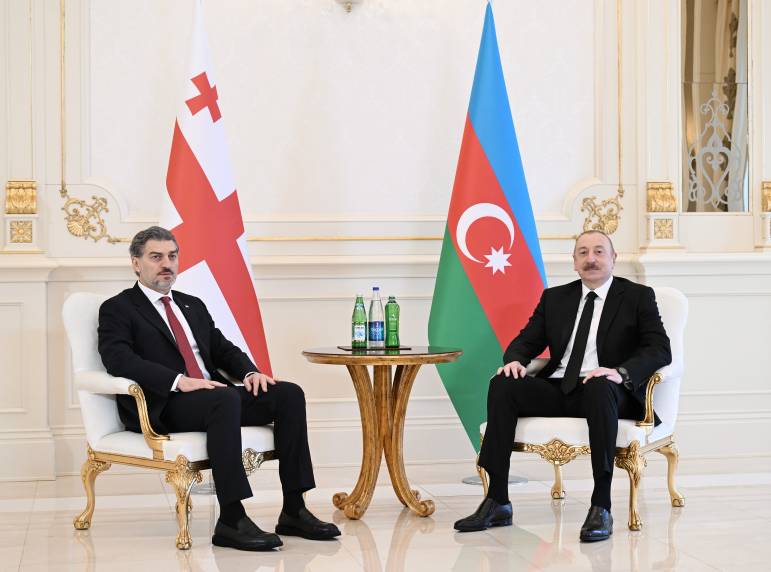20:15
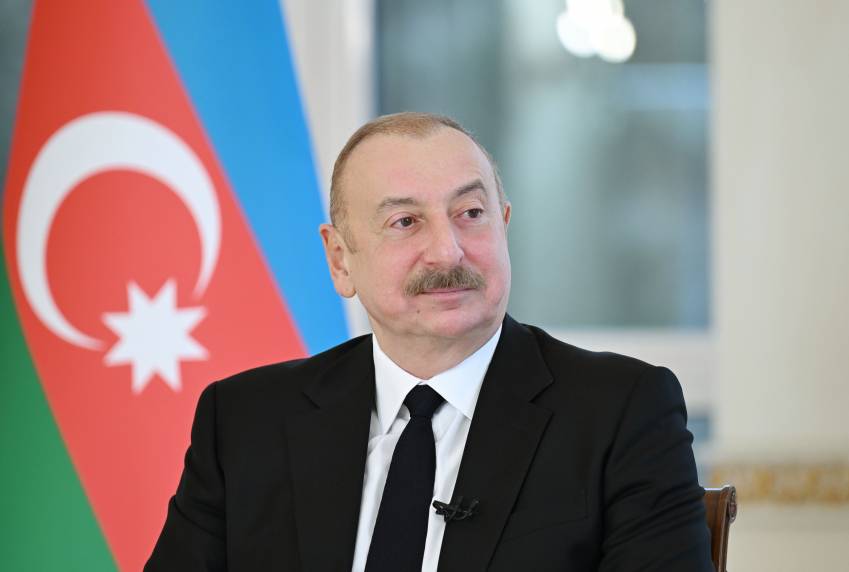
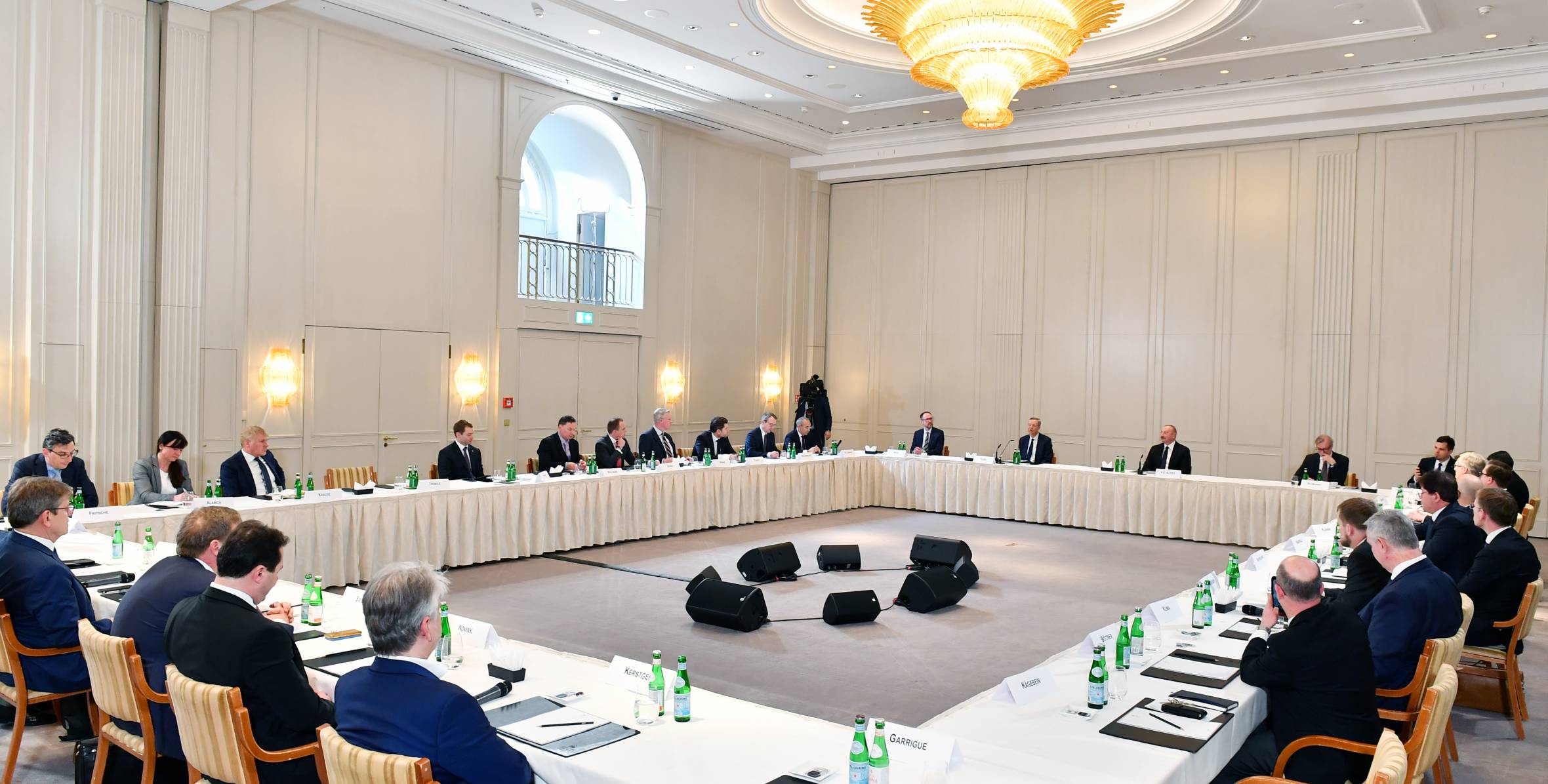
On March 13, President of the Republic of Azerbaijan Ilham Aliyev held a meeting with heads of leading German companies in Berlin.
Opening the meeting, moderator of the event, Chief Executive Officer of the German Eastern Business Association Michael Harms said:
- Excellency, President Aliyev.
Minister of Economy, Mr. Ambassador, ladies and gentlemen.
I would like to wholeheartedly greet Your Excellency here in Berlin, on behalf of the German Eastern Business Association. But I think I can say on behalf of the whole German business community. It's really an honor and a pleasure that we can have today this discussion on the economic cooperation between Azerbaijan and German business. It's for me, especially a personal pleasure, because we met just three weeks ago at the Munich Security Conference. And I'm very happy that we can today make our discussion more concrete about concrete projects.
And I'm also very grateful that so many German companies today attended this very important discussion. We have almost 30 companies from different sectors here. And we have also the pleasure to welcome representatives of the Federal Government Mr. Reichenbecher and Mrs. Alarich from the Ministry for Economic Affairs and Climate Action, so also a warm welcome. We propose the following agenda. After my short introduction, President Aliyev will give us a strategic overview about the plans for economic development of Azerbaijan and especially the chances and opportunities for German business and our bilateral cooperation.
Then, we will organize a roundtable discussion. We have clustered your companies. So, we clustered five clusters - energy, first, then logistics and infrastructure, third industry, fourth agriculture, and the fifth cluster is finance technical regulation and associations. I would ask everybody of you to make a short introduction of your company and your plans and projects in Azerbaijan. Not longer, please, than maybe two or three minutes. Otherwise, I will be very impolite and will interrupt you. Because after every cluster the President was so kind to comment and maybe react on your concrete proposals. So, the time is of the essence and also please be as concrete as possible. The best result of today's discussion would be if we will have a long list of follow up. This is I think, very important. So, that was my short introduction. And I have the pleasure to give the floor to His Excellency President Aliyev.
Addressing the meeting, President of Azerbaijan Ilham Aliyev said:
- Thank you, thank you very much, Mr. Harms.
Thank you, ladies and gentlemen for coming to this meeting. As Mr. Harms underlined, we met a few weeks ago in Munich. So, it's my second visit to Germany in less than month. This time I'm in Germany at the invitation of the Federal Chancellor Olaf Scholz. Tomorrow I will have a meeting with President and the Chancellor and, of course, along with the issues related to political agenda, we will definitely discuss also the opportunities of expansion of our trade and economic ties.
Azerbaijan’s development allowed us to rely on our own resources. Country is economically independent, and that was one of the main targets of our government. We are actually close to the conclusion of implementation of our projects, which are financed by international financial institutions, and we're planning new borrowings. Last 20 years was the years of rapid economic growth, mainly driven by energy sector. Now the target is to work more on diversification of our economy. Because with respect to the structure of GDP, most part of the GDP is now produced in non-energy sector, but still, our export mainly is oil and gas.
During the last 20 years, our economy has grown more than three times. I think this can be considered a world record. And at the same time, we based on our reduction of the direct foreign debt strategy, reduced the foreign debt, and this 1st January 2023, it was less than 10% of GDP. So, that was actually a target, which I put in front of the government several years ago. Now when the target is met, we are restarting our borrowing strategy. We have already started preliminary consultations with the World Bank and EBRD and some other international financial institutions. But now unlike previous years, when we borrowed money for infrastructure projects, road constructions, railway etc, now due to the growing capacity of our own companies and growing capacity of our industrial sector, we do not need any longer money for that. We will borrow money for those strategic targets, which our country is facing, based on the strategy 2030, which has been adopted relatively recently and the minimum amount of funds, which we will accumulate for implementation of this strategy will be 40-50 billion US dollars. In other words, we will continue borrowing on issues related to technological transfer and at the same time, we'll mainly base our future economic plans on our own resources.
As Mr. Harms mentioned, there'll be also a cluster on energy. Just a couple of words on that. Azerbaijan was named recently - a year ago, less than a year ago, as a reliable partner in the energy sector for Europe by President of the European Commission Madame Ursula von der Leyen. It's a big honor to get such, how to say, appraisal of our accomplishment. Really, we are a reliable target. We supply many European countries with oil, oil products, petrochemicals.
Some countries already start to receive electricity from Azerbaijan and, of course, natural gas starting something more than two years ago. But, due to the growing demand in Europe for natural gas from new sources, we are now planning to expand our pipeline capacity. In particular, TANAP, which has a capacity of 16 bcm, we will expand up to 32 and TAP, which has a capacity of 10 bcm, will be expanded, we plan up to 20. And that is mainly, because of the growing demand from Europe. Because, you can imagine the pipeline of the length of 3,500 kilometers integrated, free pipeline system commissioned 1st January 2021, now needs expansion.
After the beginning of the Russia-Ukraine war, we got requests from more than 10 European countries with respect to gas supply or increase of existing gas supply. And we're doing everything in order to satisfy the needs of our partners. We already have pretty diversified geography of our gas supply.
Another issue, which will be part of our discussions, is transportation and logistics. We worked very hard in order to channel the funds, which we accumulated from energy sales. So, revenues from oil and gas to channel to transportation infrastructure, now it is almost done. It was almost done a game based on those prognosis, which we had and which actually are totally covered by our infrastructure. But now again, as a result of the Russia-Ukraine war, the demand for Azerbaijani transportation infrastructure is growing. Last year we had an increase in transit goods more than 75%, and we even had some jam at our relatively newly-built trade sea port, which has a handling capacity of 15 million tons.
So, we are working very hard. We allocate additional financing for expansion of the capacity of our seaports and railroad infrastructure. And, of course, all that needs to be implemented. And of course, we hope that companies from Germany will be our partners in that area. Among our main future plans, of course, is reconstruction of liberated areas of Karabakh and Eastern Zangazur, which were under occupation for almost 30 years. Now the territory of the size of the Lebanon is totally in ruins. So, we already started the state program, which is called the Big Return. We elaborated already a program. We have already implemented the first pilot project and resettled more than 400 former refugees within only one year and a half after the war ended. And our plan is to resettle hundreds of thousands of former refugees, because as a result of Armenian occupation, we had more than 1 million internally displaced people and people who became refugees. So, this is a broad program at which we'll need a lot of resources. And we're planning to implement projects based on absolutely new modern standards. We already announced Karabakh and Eastern Zangazur as a green energy zone. There'll be only renewable sources of energy, which will not only feed the demands of people and industry, but also will be very useful for the rest of the country.
And also, a lot of potential in renewable sources of energy. Probably, we can discuss it more broadly during our discussions. But I can tell you that the potential of renewable sources of wind and solar in Azerbaijan is close to 200 gigawatts. So, now we're working already not only to continue to attract foreign investors, but also to provide necessary transmission capabilities to export this volume. Probably, now I will conclude in order to have more time for our discussions. Thank you.
Moderator Michael Harms: Mr. President, thank you very much for outlining clear strategic directions. Thank you for mentioning the impressive numbers. This is very interesting, and I have seen many participants mention it, because it opens up very clear prospects for us. Let us start with the energy field. First, I will give the floor to Mr. Weiss, representative of Siemens Energy. Speaking then will be Mr. Peter Hohaus from “Uniper”. Mr. Dohna from “S.E.T”, Mr. Pallutt from “NOTUS energy”, and then Mr. Kasapoglu and Dr. Falk. There are microphones on the table, so you can use them.
Christian Weiss, representative of “Siemens Energy”: Thank you, Your Excellency President Aliyev. Ladies and gentlemen. First of all, thank you very much for the invitation. It is an important event. My name is Christian Weiss. I represent “Siemens Energy”. I am responsible for commercial energy transactions for Europe and Central Asia. We have 19,000 employees in 90 countries. We also work in Azerbaijan. We service the energy power equipment installed there. I am pleased to note that your economy is growing strongly and you are promoting cooperation with German and other foreign companies. If we talk about specific projects, we have been operating in Azerbaijan for a long time. We are proud of our participation in the 500 megawatt power station project in Sumgayit.
We are making joint efforts with local partners in the area of operation of substations for the local power grid and electricity transmission, especially in the field of potential assessment in the Karabakh region. By the way, there are plans to reinforce electricity transmission lines from Caucasian countries in the direction of Türkiye and Europe. This can ensure complete connection of high-voltage lines. As you mentioned, we can create opportunities for the transmission of electricity generated in Azerbaijan. The last but important thing is that we are ready to undertake and support the implementation of the electrification project in Sangachal together with our partner bp. In order to ensure further development of Azerbaijan within the framework of the de-carbonization strategy, we are already involved in the design of a completely modern concept to prevent direct or indirect release of hydrocarbons into the air according to your instructions and plans. We think we can contribute to these three specific areas. I want to say again that we are working in Azerbaijan and we believe in the country's success. But I believe we can do more. Thank you very much.
President Ilham Aliyev: Thank you.
Peter Hohaus, representative of “Uniper”: Dear Mr. President, ladies and gentlemen.
I represent “Uniper” here. We are very pleased to have this exchange of ideas with you today. I represent “Uniper” in Berlin, so I can confirm that you are a reliable partner in terms of natural gas. I would like to mention this area as the first topic. We as “Uniper” work in two directions: the security of supply for consumers and, secondly, de-carbonization of the energy system. Of course, we have partners with your company SOCAR since 2006. We signed a long-term contract in 2013, and since late 2019, your company has been a reliable natural gas supplier for us along the Southern Gas Corridor. Therefore, we think that considering the current circumstances, our diversification strategy has changed. In Germany, they believe that it would be good if further expansion of the Southern Gas Corridor took place. In other words, the transmission capacity should increase to 20 billion cubic meters, because we as “Uniper” are very interested in supplying more natural gas through that route. Therefore, it would be good if both governments paid attention to the remaining issues and take steps in the field of financing, and speed up the procedures for issuing permits. Here, of course, I mean regulatory procedures.
The second step is that we have already worked with SOCAR in the field of energy efficiency. The first project was implemented in SOCAR’s “AzerKimya” complex in Sumgayit. There we built and handed over the first fully integrated thermal power plant in Azerbaijan. There is additional scope for further expansion of this project, because “Uniper” is fully committed to de-carbonisation by 2035, completely renouncing coal in power generation. Therefore, for the next energy transition, we have already created a joint working group with SOCAR to explore the potential of green hydrogen in your country. We have already commissioned a small wind power plant on Chilov Island. We see and know that the renewable energy potential is very high for the coming years. This is another area I could mention as part of the general bilateral cooperation. Our governments could support it in order not to confine energy to the traditional sectors, i.e. the natural gas and oil sector. As Your Excellency mentioned, this is very important for your country and also for diversification, and we wish to contribute to this area. Thank you very much.
Moderator Michael Harms: Thank you. Please, Mr. Dohna.
Dohna York, representative of “S. E. T. Select Energy”: Dear Mr. President, thank you for your introduction. It was a very interesting speech. We are a fairly small and not so well known German company. It is a family-owned company based in Hamburg. However, we have been operating in the energy sector, especially the oil and gas industry, for over 40 years. One of the first steps we took and the work we did was related to Azerbaijan. At that time, I was not in charge of the company, I was still studying at school. Other members of our family worked with partners from SOCAR in the 1990s and 2000s. Since then, we have maintained our relations with SOCAR. This is especially true in the oil and gas sector. However, just as your country is transitioning from traditional energy to new sources, we have also joined the transition process over the past decade. Although our expertise is in the field of shipping and transportation, we operate as a trading company. For this reason, we are active not only in Germany, but also in other countries, in the Black and Mediterranean regions. We are doing great work in Albania, and this country is one of the main participants in the TAP pipeline. Unlike previous speakers, we are not engaged in so many strategic and political projects, but we hope that some of our ideas and projects in the field of transportation that we would like to discuss with you and our colleagues from Azerbaijan and SOCAR would be interesting. Thank you.
President Ilham Aliyev: Thank you.
Moderator Michael Harms: Thank you. Please, Matthias Pallutt.
Matthias Pallutt, representative of Potsdam-based “NOTUS energy”: Thank you very much. We are a company that develops projects in the field of renewable energy. These are mainly wind and solar energy projects. We started our operations in Germany in 2001 and then moved to other countries in a short period of time. Among the other countries, there are not only European, but also Latin American countries. We have started working in Azerbaijan as well. Last year, we had very promising negotiations with landowners, electricity buyers and investors. We have not yet developed a specific business proposal.
I want to inform you that your country has huge resources. It is not just oil and gas. As you mentioned, this includes solar and wind energy. But when it comes to a solid business proposal, we usually ask ourselves a few questions. I know that when it comes to natural resources, energy production is quite abundant. But questions remain when it comes to other issues, such as energy prices, areas for investors to invest in, and interest rates. I think that as project developers, we see the same problems that everyone else faces. Here we are talking about a sharp increase in interest rates. I think such issues can limit investment. I am interested to know what your strategy is for strengthening renewable energy projects in your country? Thank you very much.
Moderator Michael Harms: Thank you, Mr. Pallutt. Mr. Kasapoglu, the floor is yours.
Edison Kasapoglu, CEO of “Edison Technologies and Engineering Group”: Mr. President, thank you very much. Your goals and the current plans you have presented make a huge impression. The plans you have outlined are quite ambitious.
Our company has been operating in the energy market since 2004. Together with our other engineering partners around the world, we mainly support major government projects. Today, Mr. President, I would like to mention three issues, and I hope to hear your answer to them. The first issue is that after Mr. Putin approved the agreement on the legal status of the Caspian Sea in August 2018, we started working with “Erlikid”, “Sinopec Engineering” and “Mannesmann” companies on a gas pipeline from Turkmenistan to Europe through Azerbaijan. The work was carried out to a certain extent. Unfortunately, we could not move on to the next stage. Here, Mr. President, I would like to ask you about the Trans-Caspian pipeline. Can this project be revived? At that time, i.e. back in August 2018, as I mentioned, it was even reported in the press that we have created a complete network for cooperation in that project. Even a very large financial institution joined the board to support the financing of this project. This is the first issue.
The second issue concerns our obligations with “DESFA” and “Snam”. This is related to the receipt of natural gas at the junction between Türkiye and Greece. There are plans to receive several billion cubic meters of gas in the direction of Europe. Obviously, “Snam” has pipelines to European countries. I would like to know if Azerbaijan can support us in purchasing these volumes? We have already discussed the issue with “BOTAS”, and they said that they would support us on these volumes.
The third issue I would like to bring to your attention is a general one. Two weeks ago, we received a delegation from Uzbekistan. They also have major plans for solar panels, large-scale power generation, solar energy.
Mr. President, you also mentioned this at the beginning. As an engineering company, we started working on the production of solar panels back in 2014 and are active in the solar energy market. If we take the current situation, we see that 95 percent of solar panels are dependent on Chinese supplies now. The production of those mono- or polycrystalline-based panels actually requires 85 percent of energy. This clearly shows the production costs of solar panels. The main costs are related to the use of silicon in the production process. We call it “quartz silicon”. We take an alloy from it and make the inner parts of solar panels. Then those panels provide solar energy. This is the final stage of production.
Moderator Michael Harms: Let's save time, please.
Edison Kasapoglu: I am about to finish. This is the last question. My question is for you, Mr. President. We have the technology and we have established a consortium. It may be an interesting project for your country that we start a solar panel production line. This will be a very energy efficient line. In that case, you can sell solar panels all over the world. This was my third question. Thank you very much, Mr. President.
Moderator Michael Harms: Thank you. These are very specific questions. A last but fairly important question in the field of energy. Here you go, Dr. Thomas Falk.
Thomas Falk, Managing Director of Falk Beratung GmbH: Dear President Aliyev, our company is an independent consulting company. My team and I provide consulting services to large international corporations on political and economic issues, as well as business development. We pay special attention to Eastern Europe, the Caspian region and Central Asia. On behalf of two of my clients, I am grateful for the opportunity to attend this event today. One of them is the Japanese company “Nikisa”. It is one of the leading manufacturers of pumps and liquefied gas, as well as separators for natural gas, hydrogen and other industrial gases, and carbon dioxide collection and storage. Our group is already operating in Azerbaijan and, for example, has supplied equipment to your country for the production of liquid oxygen and nitrogen. We have established cooperation with a local company through a German contractor. In the future, “Nikisa” wants to expand its activities and wishes to work on air separators, collection and storage of CO2, liquefied gas fields at the Baku Shipyard and the Sumgayit Technologies Park.
As to the tanks and pumps, we want to build cooperation with “AzerGold” company. Additionally, we can offer injection stations, liquefied gas, special pumps and advanced hydrogen technologies and ready to discuss possible cooperation with SOCAR.
Along with the “Nikisa” company, we work together with the “Sana Clinic”. It is one of the large private clinic network. In addition to 60 modern clinics, “Sana Clinic” as a network of medical equipment production in Europe. Currently, “Sana Clinic” provides ambulatory medical services in Central Asia.
Mr. President thanks for your attention. I am hopeful that I will get support for activity of my customers with respect to the mentioned healthcare projects. We would be happy to visit Azerbaijan to have meetings in due course.
Moderator Michael Harms: Thank you, Thomas. You are welcome, Mr. President. Please comment.
President Ilham Aliyev: Thank you very much. There have been a lot of issues of practical importance and also questions about some of our future plans. I will start in chronological order with respect to Siemens. I was participating at the opening, of the inauguration of the Sumgayit power plant. I think it was 2005. 525 megawatts, that was the first power plant, which was built on the basis the modern technology in Azerbaijan. And since that time the power plant has worked at full capacity. When we were starting this project, we saw that 525 megawatts is too much. But now we understand that that was a timely project, because now the consumption in Azerbaijan grew because of the growth of industry and population. Unfortunately, due to some climatic changes situation, the Caspian Sea also becomes shallower, and we had to build, we call it Estacada into the sea in order to absorb, accumulate more water. But the power plant works at full capacity, and we're very happy with that.
With respect to projects, which now are being implemented or we plan to implement, particularly, you mentioned the power plant in Yashma. I know that there is a tender procedure in the Yashma project and I'm sure that your bid will be one of the best. The tender procedure is open and transparent. There are several companies as far as I was informed, which are interested in that and I can just wish you success.
Just for your information, I just want to say that just recently we had a groundbreaking ceremony of the construction of a new power plant with a capacity 1,280 megawatts in Mingachevir. Despite our plans with renewables, we still understand that we will need to have more power generation. Because industry is growing, population is growing. We have 10,000 square kilometers of land, which we will rebuild. Therefore, we will need definitely additional supplies.
With respect to Nakhchivan power plant, actually, we have also a plan to transform Nakhchivan also into a green energy zone, along with Karabakh and Eastern Zangazur. There is a big potential of hydropower station building in Nakhchivan. And also there was an expertise recently conducted there and probably soon we will have some developments with respect to construction of the 500 megawatt solar power station. At the same time, traditional power station in Nakhchivan is also more than welcome because Nakhchivan has a great export potential. Because it borders Turkey and Iran, and in both countries there is a growing demand for electric energy.
I fully support your activity with respect to electric grid. This is something, which we really need because huge volumes of renewable energy demand to integrate it within the existing grid. Otherwise, we will not be able to, how to say, accumulate this energy. Therefore, it's one of the main targets in front of our energy companies. And I hope that this project will be successfully implemented.
Also, you mentioned transmission of electric energy. This is one of the most important issues, because today our export capacity is limited with the capacity of transmission. Maximum, as far as I remember, there is kind of 1,000 megawatt or maybe 1,500 megawatts of the transmission capabilities through Georgia and Türkiye. In both countries, in Georgia and Türkiye there are bottlenecks. Therefore, there must be additional investments in these two countries to expand the capability for transmission. Especially, taking into account that last December in Bucharest agreement was signed between Azerbaijan, Georgia, Romania and Hungary to build a subsea cable under the Black Sea to transport green energy from Azerbaijan to Europe. And this February in Baku, we already had the first steering committee of this project with participation of the ministers from these countries and also Commissioner on Energy of European Commission. And we agreed at the first meeting that it will be integrated project, not like Southern Gas Corridor, where we had South Caucasus pipeline, TANAP and TAP. This will be integrated projects from offshore wind farms in the Caspian to the European consumers. The first stage of transmission under the Black Sea is planned to be at the level of four gigawatts. But for that, we need to have transmission lines expanded in Georgia. Otherwise, it will be absolutely useless. Plus, I will tell later about our plans and the contracts and MoUs, which has already been signed by us. We think that four gigawatts is only the beginning. We know the demand in Europe. We know the demand in Germany. I think the figures are tens of gigawatts of demand, and the demand will grow. Therefore, we have this capacity. We need just to assemble all the puzzles on the table.
With respect to Sangachal terminal electric supply, which you implement together with bp, I can tell you that the origin of this project also comes from our policy on renewables. We agreed with bp that bp would be a direct foreign investor to build a power plant, solar power plant in one of the liberated cities of Karabakh - Jabrayil city, with a capacity of 240 megawatt. This production will be put into our energy system. At the same time, we will provide the Sangachal terminal with electricity and they will stop using gas. And this gas will be put into the pipeline, and it will come to Europe. So it's a win-win-win situation. We get the 240 megawatt solar plant. bp Sangachal terminal becomes carbon emission free and more efficient. The gas, which they use, will be exported to Europe, so, this project, which we consider to be very important with respect to energy efficiency.
And there is another project to build electric cables to our offshore platforms, which SOCAR is working on. So that offshore platforms will not use natural gas for the operation. They will use green energy and the natural gas, which is so far used as their power stations or the platforms will be transported onshore, and then again shipped to Europe. So, we are not only increasing the production of gas taking into account the growing demand to Europe. We will accumulate additional gas from energy efficiency.
With Uniper, as far as I know, the contract of purchase and sales is one of the longest, it expires 2025, as far as I remember. Then probably it will be expanded. Because our plans to supply Europe with natural gas will not be limited by this time. As far as, I know your joint venture projects with respect to energy efficiency in Sumgayit is coming to an end this summer. And you mentioned that, you consider enlargement of this project, so I fully support it. I fully support it because other AzerKimya needs it. So, cooperation already has good history. You are our clients with respect to natural gas. And, of course, the more joint business we do in Azerbaijan, the better it is.
With your project of green hydrogen on the Jilov Island, as far as, I understand, it's kind of a pilot project for you because the volume is really small. I will tell about maybe some figures about our plans. But I will advise, if you consider projects related to renewable energy and to all our partners who are interested in that I will just give you some information about what is happening including the pricing. So, existing domestic price for electric energy in Azerbaijan is affordable to foreign investors. This is first. Otherwise, they wouldn't have invested. Today we already have two contracts, which are being implemented. One signed with Masdar, another signed with ACWA Power. These are two global energy companies, and they are investing largely in renewables. These two contracts are in the phase of implementation with total capacity is 470 megawatt. Moreover, I hope we will have the groundbreaking ceremony with bp soon that will be 240 megawatt plus. So, three major energy companies consider that the pricing and regulations and the business climate in Azerbaijan for renewables is acceptable. Otherwise, they wouldn't have invested.
Moreover, we have signed MoUs. And altogether MoUs and contracts signed volume level is 25 gigawatt - ACWA Power, Masdar, bp and Fortescue resources. So, 25 gigawatt MoUs with these companies means that these projects will be implemented. Because these are serious companies and we are serious country. When we use MOU where with these companies we are absolutely sure that they will be implemented. Therefore, the potential is here, as I said close to 200 gigawatt. 157 gigawatts of offshore energy, which has been confirmed by the International Finance Corporation - the rest onshore, not to mention hydro.
So, we really will transform into important green energy supplier to Europe. And taking into account our successful experience in building oil and gas pipelines, already existing history for cooperation with countries and companies in Europe on energy security, full support by European Commission to our plants, energy dialogue between European Commission and our Ministry of Energy, which started more than a year ago. So, all these factors really demonstrate that green energy from Azerbaijan will soon be no less important as natural gas is today.
Then we come to the trading company. And you probably know that SOCAR, our energy company, also has its trading department - SOCAR trading, which is dealing with selling not only Azerbaijan's oil, but also oil of third parties. And I think that there can be some examination or evaluation of opportunities of cooperation. So, I think this is absolutely possible. So yes, I answer the question of Mr. Pallutt with respect to pricing and looking for business case.
We have a map of our solar and wind potential. The governmental body, which is dealing with that is Ministry of Energy and Agency for Renewables, which is part of the Ministry of Energy. I think if you have interest of, minister of economy can provide you with contacts and just maybe to come and to start business in Azerbaijan.
With respect to Mr. Kasapoglu’s information about the Trans-Caspian pipeline, it has been discussed for many years. I remember at least 10 years minimum that it has been discussed. While it was discussed, we built Baku-Tbilisi-Ceyhan, Baku-Tbilisi-Erzurum, Southern Gas Corridor, and we will build green energy transmission line to Europe and Trans-Caspian will be still discussed. So, this is the situation. All the projects, which we initiated, already either found their completion or definitely will be successful. Trans-Caspian for us is not our project. In Trans-Caspian project, we are considered to be a transitor. And we already many times, including myself publicly said that we are ready to provide necessary transit for our friends and partners across the Caspian, if they decide to build the pipeline. But according to my knowledge, why it is not yet been resolved, because the source of financing is not determined yet. Who will be carrying the burden of building the pipeline of the capacity of 30 bcm is unclear, whether it will be some European companies or it will be money coming from EU. For that it should be included into the joint interest project, project of joint common interest. As far as I know, it is not the case, and whether it will be government of Turkmenistan or not, we also do not know. Therefore, this is question number one. Who will pay for that? Second question is okay. It is found who will pay. Then it comes to Azerbaijan, where it will go then? Because in TANAP, we don't have spare capacity now. We will expand TANAP from 16 bcm to 32 bcm by building new compressor stations and it will be fully booked with Azerbaijani gas. So, that means that after the Trans-Caspian, its potential pipeline comes to Azerbaijan. Someone should build another pipeline from Azerbaijan, what will be that company? It's a good question. I'm not skeptical, I'm realistic. And again, it's not our project. If anybody decides to build it, we will be more than happy, because we will earn money from transit and we will provide good services to our neighbors in the East and in the West. With respect to DESFA and Snam project of natural gas from the Mediterranean, that's how I understood, yes?
Edison Kasapoglu: In fact, the transit will be carried out from Cyprus to Türkiye and Greece. DESFA is a Greek company but Snam is a subsidiary company. They undertook the obligation to provide free capacity from 1 billion to 3 billion cubic meters.
President Ilham Aliyev: Free capacity where? TANAP?
Edison Kasapoglu: No, from Cyprus. We have a pipeline until the Cyprus-Greece border. They will give us 1-3 billion cubic meters of free capacity to transport gas to Europe.
Mikayil Jabbarov: Mr. President, it is about border of Türkiye and Greece.
President Ilham Aliyev: Is there is a capacity?
Mikayil Jabbarov: Mr. Kasapoglu says, - If I got him right, - the government of Türkiye enables the company to have transit shipment capacity. It depends on finding international gas donors. Right?
Edison Kasapoglu: Right, yes, between 1 and 3 billion cubic meters.
President Ilham Aliyev: I see. I haven’t heard about this idea. Therefore, I cannot comment on it. Maybe you can discuss it after our meeting with our minister to have maybe more information and more details. Of course, any project, which needs our support with respect to energy security, we will definitely support it. And the last comment was about some activity in Azerbaijan Baku Shipyard and Sumgayit Technological Park, as far as I got correct, also hydrogen. So, I think I covered these issues. Baku Shipyard, by the way, will be very busy. We are planning to expand its capacity.
Because, as I said, there is a growing demand for transportation across the Caspian. Azerbaijan so far has the biggest trade fleet on the Caspian of more than 50 vessels. The Shipyard of Baku can produce 6 vessels per year. And this is not enough. For those volumes of oil and dry cargo, which we expect from Central Asia and probably from China. You probably heard that there is a project of construction of railroad from China through Kyrgyzstan, Uzbekistan to the Caspian Sea. And definitely then after it gets to the Caspian Sea, it will go in our direction. So, we really are now in the process of serious assessment of potential transportation volumes through Azerbaijan and we must be ready for that. We must invest. And there'll be a lot of, how to say, investment opportunities or contract opportunities in that area. I think I tried to cover all the issues.
Moderator Michael Harms: Thank you very much Mr. President. For this concrete comments. Before coming to the next cluster industry I forgot, frankly speaking, Mr. Trondle who comes from the solar capital of Germany. Maybe short comment, I think on solar.
Dirk Trondle: I am coming from Freiburg. A little bit late. Some times, it happens. Freiburg is a capital of solar industry. I would even say worldwide. And we have a very big scientific basis with engineers and they would be happy to work for Azerbaijan. And if you would be interested to work together with Freiburg I would be happy to invite you or your team from SOCAR from, the ministry and so on and you can see and discuss and I am sure there will be a lot of possibility.
President Ilham Aliyev: Thank you with pleasure. We were happy to work together and also I forgot to comment about previous issue with respect to opportunities of manufacturing of solar panels in Azerbaijan. We will be happy to work with you or any other company. Because as I said, there will be a big process, a big development. Most of the solar panels, which will be used in our solar power plants are panels, which are produced in China. They are good quality at a very affordable price. As far as I know, European producers are a little bit more expensive, to put it mildly. But if we organize the joint manufacturing in Azerbaijan, taking into account the labor force price, taking into account the energy price and local demand, I think it can work. It can be competitive.
Dirk Trondle: Freiburg city develop new generation solar panels, which are more flexible and fantastic. But it need also the science. That’s why it would be nice to have common science projects.
President Ilham Aliyev: So yes, very good. Maybe then, you can also, after our meeting, have some more detail exchanged on that, we will be very happy to organize such a production. We are now in the final stage of completion of all the necessary infrastructure for a free zone, which is situated close to Baku on the shores of the Caspian. This free zone already has first residents, and maybe some more information about free zone, its regulations and advantages can be provided by our minister later today.
Moderator Michael Harms: Okay, thank you very much. We come to the next cluster industry and also building. We start with Knotzer from “Knauf”. Please, Mr. Knotzer.
Uwe Knotzer, Knauf KG Managing Partner: First apologize for being late. I'm a general partner to Knauf Group. Knauf Group is a worldwide leader in building materials. We had 15 billion of sales last year and 42,000 employees in 90 countries. In Azerbaijan, we do marketing and trading since the 90s. And since 2008, we have a partner where we are building in Ganja materials for the local building industry. Our products are mainly based of gypsum. And we have 80 quarries worldwide and for underground mines. That's our raw material. That's where everything is based on is gypsum. And here I have a plead to you in the ministries. We run out of gypsum reserve and there is a lot of gypsum more in Azerbaijan and we need support for more capacity because we want to increase our capacity locally for production. We want to add more products in Azerbaijan. And we also want to export into Georgia and if politics allow us to southern neighbors in the Caspian. So, this is my plead.
President Ilham Aliyev: You have some difficulties in getting access to the new resource of gypsum. Did you discuss it with local officials with the Minister of Economy?
Uwe Knotzer: So far, we did not get in touch directly, because it's with the partner. But we have an issue with the quantity there. So, we really need support.
President Ilham Aliyev: So, existing reservoir is almost unlimited.
Uwe Knotzer: And we need more licenses and a new area to mine so we can continue to be productive.
President Ilham Aliyev: Yes, I fully support it. I know the project. It was implemented, as you said, in 2008 close to the city of Ganja, I think, on the territory of Goranboy district. And I think this will be possible to resolve. Maybe you can give some additional information to our minister of economy and definitely we always support foreign investors and your company is one of them. And you invested in Azerbaijan in the years, where we just started our diversification process. So, you were one of the first from Germany. So, of course, we will be glad to continue. I haven't heard that you already emptied the reserves. Probably, you work very hard. It's good, good indication, but also I now give instructions to the Minister of Economy to look at it seriously and to find additional reserves for you. So, that you can continue to operate. And as far as I know, you supply 100% local market. So, no more imports come from abroad on the country you export yourself.
Uwe Knotzer: Yes, we export a little bit to Georgia and we want to increase by building a cluster mill. And we also want to increase our shear and our partnership with a partner locally.
President Ilham Aliyev: If any assistance is needed for that Minister of Economy is here. After the meeting, he will be ready to see how we can assist in solving the problem. With the reserve, it is, I think, easy. With your relations with your partners, we cannot interfere.
Uwe Knotzer: That is another matter.
Philipp Michaelis, CEO of “Global Clearance Solutions AG”: Your Excellency, it's a great honor to be part of this roundtable discussion. I'm the CEO and founder of Global Clearance Solutions. We are active in the area of demining or mine clearance. We have visited Azerbaijan and the Karabakh region several times, and I could witness the destruction and the contamination with landmines and other remnants of war. Meanwhile, we've delivered German-made equipment technology to the Ministry of Emergency solutions. In the last few months, we've completed a very extensive mentoring and training program. We don’t only develop equipment, and we also run our operations in other countries. We would like to intensify our relationship with the government of Azerbaijan to accelerate the development of the Karabakh region and allow refugees to move back to that area.
President Ilham Aliyev: Thank you very much. As you know, it is one of the biggest challenges and obstacles in front of us to resettle former refugees sooner than later. Because according to our very accurate estimation, Armenia planted more than 1 million mines during the times of occupation, and since the war ended in November 2020, we had almost 300 Azerbaijanis either killed or seriously injured. Our potential is relatively limited. Though, recently we purchased equipment from different countries, including European countries. Even we now use drones, which can detect from the air. And also training is very important. So, thank you for that support. We need to maybe look in more detail into your proposal, because frankly, speaking when we were looking to invite foreign companies to operate the price for demining was much higher than local. So, demining per one square meter, European price several times higher than the price, which our national demining company is ready to do. Recently, several private Azerbaijani companies emerged, which are now also dealing with demining, and their prices are acceptable. Because as you can imagine, it is a very costly, costly thing because we are dealing with 10,000 square kilometers. Of course, not every meter of that will be checked because it's high mountains. And, of course, we know where the potential mine contamination is. But I think that maybe have more detailed discussions with our demining agency. Because today three structures provide demining in Azerbaijan. Number one is ANAMA. I mean, number one by the volume of activity. This is Azerbaijan demining agency. Number two is the Ministry of Defense, special platoons and battalions created for demining. And Ministry of Emergency Situations - they have a very small share in that process. So, I would recommend maybe you to help to establish contact with our national demining agency and to see about the pricing, to see maybe we can have some joint venture process. So, I think there is significant potential for that, unfortunately, for many years.
Philipp Michaelis: Unfortunately, we can see it in many countries. We believe that we can reduce prices by applying international evaluation and infrastructure. Yes, the price is high. However, we saw the price of 15 cents per square meter in 20-25 year conflicts Thank you.
President Ilham Aliyev: Thank you.
Moderator Michael Harms: Please speak louder. We have an hour to go. That is why everybody must be able to give his question. Mr. Schulz, please.
Olaf Schulz, Representative of Nokia company: Nokia today is a business-to-business innovation and technology leader in digital infrastructure. So we are not a mobile phone company anymore. I still have to analyze it. Most topics we have discussed so far depend on digitalization to be efficient and successful. And, of course, on a good digital infrastructure. Of course, we mean electric networks and power transmission. All governments have digitalization programs. Your government also has it. You also gained success in this field. We decided that Azerbaijan is the country involved in large regional activities. So we have established our regional hub in Baku, so we manage our business in the regions also Central Asia from Baku. We also believe this is only one side of the coin when we want to be part of your success story. So we believe that technology is on one side and people are on the other side. And the best technology doesn't help if you do not have the people who are educated and know to leverage the technology to the benefit of the country. We cooperate with the Innovation and Digital Development Agency. We just also gave money for the education program. We will open a fixed network laboratory in Baku next month. We do not want only to see Azerbaijan as a market where we deliver products. Today, we do our job, and we are proud to do that. But we want also to be part of this digitalization journey in the country. And of course, we hope also to grow our business. There are areas where we would like to do more. With respect to digitalization, we would like to discuss where it makes sense for you to do more so that we bring the return for the investment back as soon as possible. Thank you
President Ilham Aliyev: Thank you. By the way, digital transformation is now part of our strategy of not only strategy 2030 but also part of our priorities. And it was not by chance that our Ministry of Communications and Transportation was renamed, and now it's named the Ministry of Transportation and Digital Transformation. This was not just a change of name but the change of approach. And I fully support what you said. They must probably be more active contacts with our ministry and your company because we plan to be amongst the front liners with respect to digital transformation in our region. This is a general how-to strategy of our government to try to attract and apply modern technologies in the areas which have great potential and not to be late and not be lazy. Not only think about oil and gas and our geography and transportation but to attract companies and businesses to the contrary, which can be helpful for our future. Plus, I'm delighted to hear that you've selected Azerbaijan as a center for your operations in Central Asia. Every time I hear this news, I once again realize that we did the right thing to provide not only information about what we are planning to do but also provide a good investment climate. And by the way, just for your information, the World Economic Forum of Davos - also decided to select Baku as a regional center for the Fourth Industrial Revolution Center, which was inaugurated almost two years ago, and it covers Azerbaijan and Central Asia. So, it's not only a geographical connection, but I think it will also be technological. From the point of view of geographical proximity to the regions of Europe to Asia, of course, it isn't easy to find a better place. Maybe I should stop speaking as a guide, but really, my task is to attract investors, technology, companies, and strategic partners in areas not related to oil and gas. Oil and gas are completed. What next we will do is based on an already existing pattern. Now with digital transformation, which is new for us. We need long-term strategic partners and hope that that will be the case with NOKIA. Thank you.
Moderator Michael Harms: Very good. Mr. Kappelhoff. Please, one minute.
Kappelhoff Jan-Bernd, Representative of Tauber company: Mr. President. Thank you for affording your time and roundtable. Our company is operating in Germany, Portugal and Switzerland. It specializes in infrastructure creation. We used to implement works for Azersu. I am hopeful that we can do more projects for Azersu in the future. Thank you.
President Ilham Aliyev. There'll be a lot of things to do. Concerning water distribution. We are implementing the projects in many cities where we still need to upgrade our water supply and sanitation. And our target is to have 100% coverage of drinking water nationwide. Of course, it will be challenging because it's a big scope of work. But, we will also have plans to have some structural reforms in water management. The time has come for that. Now the government is evaluating different options and applying modern technologies with respect to water distribution, especially now that there are fewer and fewer water resources every year. We see it. Unfortunately, as I said, the Caspian Sea is becoming shallower, and also we have less water in our rivers in transboundary rivers and the rivers which take source in Azerbaijan. So, water management and efficient water management will definitely be one of the priorities for the coming years.
Marius A. Ryrko, Managing Director of “Gerber Architekten International Gmbh”: Your Excellency, Mr. President, I'm very honored also to be here in this group. My name is Marius Ryrko. I am the managing director of “Gerber Architekten,” and we are architects, landscape architects and urban planners, and of course, interior designers. Now we have been building for about 60 years in Germany, also in Saudi Arabia and China and mainly in the public sector. So we've also been helping Germany with universities, public sector buildings, libraries, health projects, and many other useful environmental buildings. What we're experiencing in Saudi Arabia is the transition from a fossil fuel-based energy-based society to a renewable-based society.
We started activities last year in Azerbaijan, in Baku. We have also visited Karabakh. We have talks with the Mayor's Office about our park designs in your city. We are currently in discussions with project developers about residential and other projects. I've got two questions for you, Mr. President, with regard to renewable energies. In the future, I think buildings can become energy producers rather than just energy consumers. Will there be a policy driving that change? If so, “Gerber Architekten” will be pleased to help drive the change. Secondly, my observation of traveling around Baku is the influx of people. I believe with the growth and success of the city, the visitor congestion issue that is visible. We've experienced this issue in other places. Is there a transit-oriented construction plan or metro plan that you would like to share with us in the future? Thank you very much for your attention.
President Ilham Aliyev: Thank you for visiting Azerbaijan. And you visited Karabakh, and you know probably, you are aware of our plans. We have already approved the master plans for all the cities. Now more than 20 villages` Master Plan has also been approved. And we also invited international companies, you know, from different countries and also local companies. And as I said, in Karabakh and East Zangezur, we want to build residential areas and public spaces - ecologically friendly and very easy to live in and with good access to transportation and also services.
With respect to your question about the buildings, which produce energy, during my participation at Davos World Economic Forum, I met the owner of one company. I don't want to name the country and the company that gave me this information. It was very, very interesting news for me. And immediately, I gave the instructions to the Presidential Administration, a coordinator of all the reconstruction in Karabakh. And now, we have already started to work on the pilot project. The pilot project probably is a feasibility study. It will be ready maybe in a couple of months. The building itself looks very beautiful and very impressive, and it produces not only panels, but it also produces energy. So, if you have this technology or know-how or can make proposals, that will be more than welcomed because this is a kind of new development, new technology. I think for Karabakh, it will be very appropriate, especially considering that it is a green energy zone.
With respect to Baku city development, you've been to Baku, and you know the city. Yes, with the underground railway, we have big plans. We are among a few countries of the former Soviet Union which built underground because many of them stopped it after the collapse of the Soviet Union. We have a strategy, and also we're working on integrating our public transportation with underground, and we are now close to applying the unified system for that. Plus population is growing. Baku is becoming bigger and bigger. Therefore, now we are elaborating on the new projects concerning the traffic, roads, bridges, tunnels, and everything in the process. Plus, there is a growing interest again - a new construction boom. Because Baku already had a couple of waves of the growing market of residential districts. So, I think your project will be interesting to look if I can look at some ideas, I will be very glad.
Marius Ryrko: I would love to share, of course.
President Ilham Aliyev: Maybe you can share with me after the meeting.
Marius Ryrko: I mean, I should add, as Mr. Schulz said, of course, having worked in the Arabian-speaking region and the Chinese region. Coming to Baku now as a center of exploring and contributing to the building environment in the Central Asian region is our goal. And I would welcome support for a smarter and healthier building environment. Of course, for everyone.
President Ilham Aliyev: Thank you.
Moderator Michael Harms: So let's come to the sphere of logistics and infrastructure, and I would start with Mr. Schulz, then Mr. Torsten, Mr. Klaner. Mr. Chairman and Mr. Nowak.
Philip Sweens, Managing Director of “HHLA INTERNATIONAL GMBH”: Excellency, good afternoon. Phillip Swings, Managing Director of HHLA international. HHLA is the Hamburg Port. We are majority owned by the city of Hamburg. Also, the stock is listed, and we are mostly known because we are the operators of the container terminals in the port of Hamburg. Still, also we are the largest intermodal operator in Western Europe. We've been present in Georgia and Azerbaijan for more than 20 years with a subsidiary called “HHLA Project Logistics” that started at the time with the transportation of NATO’s shipment to Afghanistan and has now developed gradually in everything high and heavy. I would say moving whole factories between the Black Sea and Azerbaijan. We recently also opened an office in Kazakhstan. We see a lot of chances with the Middle Corridor you addressed earlier, but especially the leg between Aktau and Poti ports or Kars point in Türkiye - some bottlenecks between the different moving from the Caspian Sea to the rail and sea. And there, as an operator, we would see a big chance. We see geopolitical chances that the corridor can develop. And we would be very interested from an operational point of view to support that development.
President Ilham Aliyev: As I already said, now we are facing a new challenge. We need to expand the existing capacity because the capacity we will be building is based on the existing volume of cargo and our prognosis. So, after the big turn towards Azerbaijan from Central Asia, we need to work hard. So, just for your information, we are now investing in Azerbaijan, and probably next year, this investment project will be completed into the expansion of one of the bottlenecks, the Baku-Tbilisi-Kars railroad, its Georgian segment. From 1 million tonnes it will be expanded to 5 million tonnes. Azerbaijan's investments, additional investments will be more than 120 million US dollars, and we will complete it hopefully next year. There are other bottlenecks, one of which can be our trade seaport. We are completing the feasibility study of expanding from 15 to 25 million tons and 1 million TEU. But, again, we have some other bottlenecks along the route. Therefore, of course, we are working on the integration of transportation, infrastructure and also on customs administration. In several days in Baku, there’ll be a visit from the general director of the World Customs Organization. And one of the things we'll discuss will be how World Customs Organization can help coordinate between Central Asia, Azerbaijan, Georgia and Türkiye. To have this route integrated, of course, there must be a unanimous approach to the tariffs because if one country, for instance, Azerbaijan, reduces a tariff and another country does not reduce or increase it - it will not work. And from the point of view of transparency, good governance and management, probably your representatives in Azerbaijan, you said you were there for 20 years, can see many changes in the transportation segments of our government. And it is transparent, and it should be efficient and able to accumulate the cargo. Plus, we should not forget that there is another transportation corridor North-South, which also crosses Azerbaijan. And we are exporting or transiting cargo not only from East to West but also from North to West and South to West. So, the pressure on our railroad infrastructure, seaport and highway will grow. So, you know that we have a diversified railroad system, but now we are upgrading our railroads to increase the speed of trains. So, that will make the time of transit time even shorter. And at the same time, of course, all that should be done in coordination with the facilities on the eastern shores of the Caspian - the ports of Aktau, Kuryk, Turkmenbashi and Baku need to work as one single mechanism. And also, of course, if you have some ideas and recommendations, what you think will be good for transit volumes, and business will be highly appreciated.
Moderator Michael Harms: Thank you, Mr, Kerstgins, please.
Heinrich Kerstgens, Corporate Representative and Director of Board Projects of “RHENUS SE & CO. KG”: Mr. President, you answered many of my questions already. I am Kerstgens, and I represent Rhenus. Rhenus is a company working in 60 countries, doing logistics, and we have 40,000 people. And we have been in your country for eight years, as well as in Baku. We also work in Central Asia, China, India and everywhere around. And I just returned from my second business trip to Azerbaijan last week. Our strategy is to try our utmost to bring the Middle Corridor to a real running system. And for that, I also talked to the advisors of the Minister of Economy and advisers of the Minister of Transport and the CEO of the Port of Baku in Alat and the CEO of the Alat Free Economic Zone: and very good talks, very productive talks. And we made a study; we made some plans already for the Port of Baku. And we saw that the capacity plan might be a problem that is not feasible. And we made an idea if you could redesign the container part of the Port to a more efficient system, which will be much cheaper, only 200 million instead of more than 1 billion for that and so, we are working on that already now for like one week. And the other thing is we discussed with the Ministry of Economy the shipping on the Caspian Sea. Because what is there now is not feasible to stand the pressure of transport needed in the future. And there is a need to design the Caspian Sea optimized ship because, as we already mentioned, the Caspian Sea is going shallower. And so there is a problem with draught as we know that here in Germany there was also the same problem with the River Rhine. And so, there needs to be a design of a unique shipping concept that could bear the ice waves also. And that has to be done. And we see in the future, there will be a need for these optimized ships. Between 20 and 40 of them may be distributed between Kazakhstan and Azerbaijan. But because ships tend to run more than 20 for up to 40, 50 years. We think also the propulsion techniques should be already for the future beyond oil, and all that should be done jointly together with ministries, with people from the industry, and with universities. And that can't be only invested by a private company. There should be a joint effort of the state. And the last thing I want to mention is that you already mentioned that as the Baku-Tbilisi-Kars line, and you are also a shareholder in operation in Akhalkalaki, which is the gateway to trucking cars. And what we see there is that the planning of the terminal is not a feasible term and there should be done a very, very urgent redesign and we are willing to help you with that. But it should be done. Otherwise, there won't be any good connection to Türkiye. Thank you very much.
President Ilham Aliyev: Thank you very much for your valuable ideas. I'm glad that you recently visited Baku and met all the officials. You mentioned the Alat Free Zone port. The ministries of Transport and Economy are a good contact for that. And, of course, your recommendations with respect to optimizing the design of ships will be very valuable. Because as far as I know, the idea was to continue constructing our ships - whether a dry cargo ship or tanker. But if due to some reasons or maybe some shallow waters and some canals digging, we still have to dig canals on both sides of the Caspian.
Suppose there is a kind of new approach to optimizing ships, which can be bigger capacity or can go faster. I think that we will be taking this into account. With respect to the terminal in Akhalkalaki, it will also be interesting because I am not deeply involved in these technical issues. My target was to provide financing for the expansion of the Baku-Tbilisi-Kars. But, of course, we need to do it based on efficiency and concerning seaport expansion. If we can do the same thing at less price, of course, we have to do it. And, definitely, we'll be very glad to get your proposals. I do not know whether the Ministry of Economy has already received these proposals or not. So, in a few weeks, there will already be a proposal to make a decision. Very good. So, you will be informed about that. Thank you.
Representative of “Thales” company in Azerbaijan and Georgia in Henrik Klaner: Dear Mr. President Aliyev. Thank you very much again, also from my side, for taking the time. I have been in Azerbaijan for more than 20 years. As you may know, we have a project with the Baku Metro. In the future, we will concentrate more on doing business with Azerbaijan Railways. Three weeks ago, I was honored to meet Mr. Rustamov from Azerbaijan Railways. We discussed the modernization of the East-West corridor from Baku to the Georgian border. And we have also discussed the north-south corridor from Iran coming via Baku to the Russian border. It's definitely one of our key issues in the future. We are ready for business to improve Azerbaijan’s railways. As the first step, we are planning to open the authorized center of the company in Baku. It will be the center of operations for Azerbaijan, Georgia and Central Asia. Just one additional piece of information. The German part of Thales will be sold to the Japanese company Hitachi. So in the future, the company will operate under the Hitachi Germany name. The company will not have other businesses in Azerbaijan. And this will be the German business. Thank you very much.
President Ilham Aliyev: Thank you very much. All these projects are very important. I am very glad that you met with the officials. With respect to metro construction, you know our plan. We do it step by step with the railways. Yes, we need to upgrade, as I already said. East West is mainly done, but North-South, the speed of the trains is very low. So, now we are investing in the reconstruction of a railroad from Baku to the Russian border, and hopefully, in a couple of years, it will be done. And also, we are planning to change the direction of the railroad, which goes in the South direction, because now it runs right along the shore of the Caspian Sea. So, the potential of the North-South transportation corridor, the potential volume of cargoes will be from 15 to 30 million tons. This is recent information we have gotten from those who plan to use Azerbaijan as a transit country. Therefore, we should have such a railroad that will be able to transport this volume. So, we hope there'll be a lot of business activity on that route, not only building the railroad but all the necessary additional industrial and commercial infrastructure. And, of course, the railroad should be built based on modern standards. So, without direct access to open seas, Azerbaijan is already becoming an important transportation hub because it's not just about east to west and backward, but from north to south and from north to west. Because you know that there is a significant need now for companies to find new ways of transportation or their cargoes to be able to export their goods. So, transportation will be one of the drivers of our economy. We again hope not only from the point of view of getting transit revenues, but we create additional opportunities for businesses, mainly small and medium enterprises. And the Alat Free Zone will be instrumental, I think, in bringing foreign manufacturers to Azerbaijan.
Representative of Germany’s Silkway West Airlines: Dear Mr. President, ladies and gentlemen. I represent Silkway West Airlines here in Germany. SIlkway West is putting the next operating flights to Azerbaijan. So we have 28 flights per week from Frankfurt-Hahn Airport and additionally flights from Leipzig airport to Africa. And so we use the Baku hub. The Baku hub has a very good performance. I mean the port, the airport in Baku. We have transit flights to the Asia Pacific region, but also for the region of Central Asia, and Baku is for the German economy and also the airport hub for more than 90 million people in that sort of thing. So I would like only to give that statement because we are quite happy and satisfied sector and thank you for your support of your government and also of course for the German government because in the last years, especially during the COVID times, there was a great support to operate flights. Thank you.
President Ilham Aliyev: Thank you very much. I'm very happy that you are happy. This is the best news. Thank you, wish you success in the future.
Mirco Nowak, CEO of “LUNO-Gruppe”: Thank you, Mr. President. It's a great honor to be here. Thank you very much, ladies and gentlemen. My name is Michael Nowak. I'm the founder and the CEO of LUNO-Gruppe, working for over 30 years now with Eastern Europe based in Hamburg. And as a Hamburg company, primarily, of course, our business is logistics and infrastructure development. So, one of my favorite topics in the last two years is the Middle Corridor, the development of the Middle Corridor. We established a company in Georgia and are now doing a feasibility study of the Middle Corridor. This actual data now has figures with a forecast for the next 30 years and will be ready at the end of the following month. So, I think it's also very interesting for you.
We further work on the infrastructure development of the ports. We have a massive investment project on the Port of Constanta. And the ports of Poti and Anaklia, of course, we look over there. There is an investor who wants to engage. They're actively involved with new ports and terminals - Poti and the new Anaklia. That's my question for you: Maybe, like the Kazakhstan railway, which is now actively developing international logistics not only inside Kazakhstan but outside, they want to invest in the Port of Poti, as I heard there was a terminal maybe if Anaklia will come. I don't know exactly. I don’t know the figures now, but hopefully, it will be attractive. Maybe it's interesting for Azerbaijan, too, to have a new connection to the Black sea. So, that will be very interesting. We are very active there.
President Ilham Aliyev: Thank you, I was informed about a project with respect to Anaklia Port in Georgia. Some, maybe, six or seven years ago, if I'm not mistaken. We started actually to evaluate the possibility of being a co-investor. The Georgian government invited us to co-invest, but the Anaklia Port project was cancelled. You know it. And now we heard that it's again coming back. So, we have to look at it again because there were probably reasons why it was canceled and is now re-emerging. So, if we have information about the composition of investors, the shares of investors, and who will be the co-investor for us, it will be interesting to look at this capability.
Because now, with respect to this new direction across the Caspian, what we discussed today, there'll be, of course, the need to expand seaports on the Black Sea. And also, I'd like to say that our Caspian Shipping Company, ASCO, has vessels in the Black Sea, and they have plans to acquire more vessels. Because they are not only in the Caspian, they operate but in the Black Sea. But their operation is relatively modest in the Black Sea. But, we think there is considerable potential for the Azerbaijan Caspian Shipping Company to be more visible in the Black Sea. I know that there are plans to build new vessels in the Black Sea between European ports and Georgia ports and Ro-Ro vessels and others. And the Caspian Shipping Company of Azerbaijan has potential, and it has governmental support. The government can also provide some financial assistance to them to use this opportunity to do good business and, at the same time to contribute to transportation security. So, let us discuss the work, look at the figures, and then we'll decide.
Moderator Michael Harms: The next very important section is agriculture.
Export Director of “EUROPLANT Pflanzenzucht GmbH” Thomas Bottner: Thanks for allowing me to ask a question. Interestingly, agriculture is part of today’s discussion. As you mentioned, your country is trying to reduce oil dependency. We are glad that we joined this event. We are a company specializing in potato seeding with 120-year experience. We are the country’s leading seed supplier. It is not only about the products sold in supermarkets but also potato chips and fried potatoes so that your country does not import and export the finished potato products. We are ready to support your producers to increase productivity and efficiency. Thanks.
President Ilham Aliyev: Thank you very much. With respect to the potato production in Azerbaijan, you know that finally, we got, how to say, to the point when we are self-sufficient, and for even some years, we have exported. But of course, we need to increase productivity. Because you know, our country – there are particular regions in Azerbaijan, where potato production is really, really very efficient. And also, now, in the liberated area of Karabakh and East Zangezur – there is a significant potential for agriculture. And we are now working. Our government, Ministry of Agriculture, Ministry of Economy and other bodies, President’s special representatives in those districts plan to use this agricultural land maximum efficiently. Because for 30 years, there was an illegal use of our land by Armenian occupation forces, but very inefficiently because they did not invest. They were using what the land could give, and productivity was very low. It was three times lower than productivity, which we have in Azerbaijan in different cultures. So, we are preparing, and maybe it's already almost done. We will recommend to our farmers who will return to the liberated territories what kind of culture they should produce. We cannot dictate, but with subsidies with flexible subsidies, we can direct them to use part of the land for potatoes, part of the land for fruits and vegetables, and part for other purposes.
Therefore, with respect to the supply of seeds, you will know better than anyone how this is important. And of course, if you started to produce products like chips – it is very good. And it will be, I think, the good diversification of our exports and reduction of our imports. And what are your plans in Azerbaijan with respect to manufacturing maybe?
Thomas Bottner: The main issue is productivity. Production per hectare is important because if productivity is low, it becomes more profitable to import. For this reason, our primary goal is to increase productivity.
President Ilham Aliyev: Very good. Thank you.
Moderator Michael Harms: Mr. President, representative of the Regional Director of CLAAS Global Sales GmbH company Klima Martin is participating in the event. The company is specialized in machinery manufacturing.
Klima Martin: You mentioned productivity. Today, there is a transition in agriculture from small and medium-sized production to industrial volume production and more modern technologies, and large equipment and machinery are applied. Today, the biggest problem we face is our partners’ financial difficulties utilizing big equipment. My question is concerned with financial support for importing this equipment. In addition, training is also important for technical inspection and equipment usage. Engagement of more people in such training is one of the main issues.
President Ilham Aliyev: Thank you. Yes, of course. I know your products. I, as you mentioned, visited your stands many times at our agricultural exhibition. And we were purchasing equipment from you. I think from the state funds, but I don't know now what is the situation. If there are problems with funding the private companies or some loans to private companies, or you mean direct purchasing from you, that can be done. You tell me what practically should be done to expand our cooperation?
Klima Martin: Private companies need more funding because the volume of production increases, and the need for this type of equipment rises against the backdrop of demand. As I said, technical service and training.
President Ilham Aliyev: Concerning the training, we hope that you will provide services for that with respect to the funds. We have a mechanism for funding small and medium-sized businesses through our fund, which is under the umbrella of the Ministry of Economy. Maybe you can give some information about some soft loans, low-interest loans, to the private sector to purchase this equipment.
Mikayil Jabbarov: Thank you very much, Mr. President. I think your point is on concessional. Currently, we have roughly 100 equivalent of 100 million euros per year - soft loans up to seven years, mainly to small and medium enterprises, mainly for the modernization of the enterprise. I will be happy to get in touch, maybe to see how the program can be designed and if I can match you with the banks, agent banks. Because the government official does not make the decisions, decisions are made by private commercial banks.
President Ilham Aliyev: Also, I think we'll be good if you look at the opportunity to create a service center in Karabakh. Because we have two industrial zones in Karabakh - one in the Aghdam region and another in the Jabrayil region, and they're already service centers of some machinery in the construction process. I think they'll be good from all points of view because of the agricultural equipment. Tractors and combiners by Class are the most popular in Azerbaijan. So there is a significant potential because there'll be a lot of agricultural activity in that area.
Brodersen Per, Managing Director of German Agribusiness Alliance: I'm the managing director of the German agribusiness Alliance, which is an initiative of the German agro-business and we've been talking already about natural resources, about renewable energy and talking about this without mentioning agriculture that's completely incomplete. Your country is doing a very good job in producing pomegranates, for example, tomatoes, and even sugar beets at the moment. However, I looked at the numbers in 2020-2021; Azerbaijan had to import wheat, for example, and vegetable oil for more than $300 million a year. And we would like to team up with you to enlarge productivity and secure self-sustainability in your country in the countryside to create more jobs in those rural areas. And you mentioned the phenomenon of climate change and irrigation problems. The German agribusiness alliance can serve as your partner for modernizing Azerbaijan's agricultural sector. I would be very glad to team up with you and your colleagues for future enhanced dialogue.
President Ilham Aliyev: Thank you very much. You touched on a very important issue with respect to irrigation. Until relatively recently, we had a very chaotic situation in that area. Especially concerning the absence of meters on our water reservoirs and also unfair distribution of water resources among the farmers. And this was bad management and also a lot of wrongdoings. So now, we established a special governmental commission that deals with these issues. And our water reservoirs are monitored daily. So, that was the first thing. Now we need to apply new technologies with respect to the efficient use of water because, as I said, every day, we have a drought. I think it's already the fifth or sixth year that we have had a drought. It was never like that before. Because, before, it was good one year and the following year it was bad. It was compensation. But now it's an ongoing process with less water in our rivers.
So, we need a modern irrigation system, which will save the water needed. Plus, many channels built during the Soviet times were not concrete; there were no pipe channels, only sand ones. And, of course, there's a penetration of water, many losses, plus the soil becomes useless. Therefore, now we are facing the challenge of how to modernize these canals, what will be the most efficient technology and also irrigation of land in parallel with that.
So, food security is really something that we seriously need to take care of. We cannot satisfy 100% of our needs with what we consume, but we at least can satisfy the basics, for instance, with respect to grain. We do not even target 100% self-sufficiency because it will just occupy a lot of lands, which can be used for other products where we have more efficiency. But at the same time, trying to be maximum self-sufficient is vital from the point of view of security.
Now there are significant disruptions in supply chains, and there are sometimes big problems in even importing the goods you contracted and paid for. We faced that in previous years several times. This becomes issue number one. Water is a basic need for that. And I think we can have a kind of long-term strategic institutional cooperation in this area with respect to the elaboration of the water management strategy. So, we will be very grateful if you can support us.
Moderator Michael Harms: Mr. President, do you have time for two more questions?
President Ilham Aliyev: Of course.
Michael Harms: Two other important areas are funding and technical regulations.
Evgeniy Epifanov, Senior Regional Manager of “ODDO BHF”: Hello, Mr. President. Thank you for taking the time for interesting talks and fascinating thoughts. I represent the banking sector. As you mentioned, the Russia-Ukraine war has opened new opportunities for countries like Azerbaijan. We are already represented in Azerbaijan and cooperate with the International Bank of Azerbaijan and Pasha Bank. We are ready to support big projects. We are ready to promote cooperation between the German export agencies and the Ministry of Economy, Small and Medium Business Development Agency. In October last year, we had a fruitful meeting with the Chairman of the Central Bank, Taleh Kazimov.
President Ilham Aliyev: Thank you very much. Probably you've heard some comments concerning some countries in our neighborhood which are involved in this illegal activity. This country also starts with “A,” but it is not Azerbaijan. And it is not a secret, and all the figures are available. And, of course, we wait for when they will be sanctioned or whether they will be sanctioned for that. Because if you look at what is happening, the comments of very respectable officials of different countries clearly demonstrate who is in this, I would say, dirty business. Azerbaijan is not, and from the very first days of this process, my instructions were straightforward - no parallel input, no facilitation to avoid any sanctions. We are law-obedient people, a law-obedient country. We don't need the headaches. We don't need to earn money, which is not clean. What we have and earn is enough, and we want to protect our good reputation, also in financial markets. And also, as you mentioned, you spend some time in Azerbaijan. Hope you enjoy that time.
I`m very glad you also maintain contact with our leading financial institutions. You know that we had problems in the banking sector, severe problems. One of them was the International Bank of Azerbaijan, which attempted to destroy the whole financial system of Azerbaijan. That was a deliberate provocation, and it was not just the stealing of money from the government. It was an attempt to destroy Azerbaijan's financial system. And we more or less know who was behind that.
So, we had to do a lot of cleaning. And I think we finally managed to come almost to the end of that process. So, the banking sector in Azerbaijan is healthier than ever before. According to some additional information, which I got from our bank, and Central Bank officials, there are still issues that we need to address. But I am sure that very soon, the banking system in Azerbaijan will be one of the most transparent and efficient in our region.
Managing Director of ALPHA GmbH Thomas Krause: Your Excellency, Mr. President. It is very good to sit here and discuss topics covering various fields in the interests of our countries. We offer solutions to engineering companies. We provide services in secure solutions for plant construction, project management, technical charter, and cybersecurity. We cooperate with some companies in Azerbaijan, including Siemens Energy.
President Ilham Aliyev: So, we have the Regional Development Program, which is a five-year program adopted every fifth year. The first was adopted in 2004, just several months after I became president for the first time. And now, we are in the process of finalization of the fourth program. All these programs have been published in our press, and they are known. So, these programs are very concrete, and they reflect the projects which will be done in Azerbaijan within five years. Apart from that, we have an annual investment program. Now we divided it into two. One is traditional, and another is for the reconstruction of Karabakh and East Zangezur. So, all the information about the projects, which will be implemented this year, and next years are with the Minister of Economy. The minister is here. You can discuss with him later even more practical issues.
At the same time, as I said before, we already approved the national development strategy until 2030 with a 42 to 50 billion US dollar investment. Most of that investments will be state-funded, but at the same time, there will be private and public partnership projects also. Therefore, concrete projects, which we will implement and need to implement, we have in our ministers’ portfolios. So, you are more than welcome to participate.
Moderator Michael Harms: Mr. President. Thank you for affording your time. We went beyond our schedule. We know your schedule, so it is an honor for us. I believe that we achieved our goal. We have a long list of projects to follow. Let me mention a few of them. Of course, green energy is one of the priority issues. Given your country’s immense potential, green energy logistics is very important because there are many projects on a global scale. For example, the country which can organize the best logistics for green hydrogen and other energy sources will be the winner, and there Azerbaijan has a better position. Transport and infrastructure are also important. It is clear.
You mentioned not only transport and logistics but also industrial development along transport routes. I believe that it is also an important issue. Then, digitalization and agriculture were mentioned, and some participants indicated personnel training for all spheres. This is an important matter, and we are ready to cooperate in this direction. The last important issue for your country is the rehabilitation of irrigation canals. I think Germany can offer much to you in this field. This matter can also be put onto the list of issues to follow up on. We will probably discuss this with the minister, and at the appropriate time, we will have online meetings with respective ministries. Maybe, you will appoint a coordinating person, and I can later announce the business delegation to Baku in the second half of the year. Thank you.
President Ilham Aliyev: Thank you very much. First of all, thank you for the initiative to organize this meeting. And thank you to all the participants for a fascinating discussion.
Just a couple of remarks to conclude with respect to education. We'll be happy to see more cooperation in this area between German educational bodies and Azerbaijan, especially in the area of vocational training. Because there is a significant demand now, especially in the areas we discussed - agriculture, etc. So, I think we need to, perhaps, have a special track on educational cooperation. Also, I would suggest before the delegation comes to Azerbaijan, I will suggest to, maybe, to channel some concrete proposals to us through the Ministry of Economy. So that by the time you and the delegation come to Baku, we have already analyzed all those proposals. And maybe, by the time when you come, or maybe even before that, we can, if everything goes successfully, conclude the contract. So that could be a good, also a practical result of your visit. And, of course, I invite all the participants and maybe a bigger group to come to Azerbaijan when it's convenient for you and maybe to spend several days and to meet and to continue our discussions.
I'm looking forward to having a very strong partnership between Germany and Azerbaijan in the area which we discussed and beyond. Thank you very much for your attention and your patience.
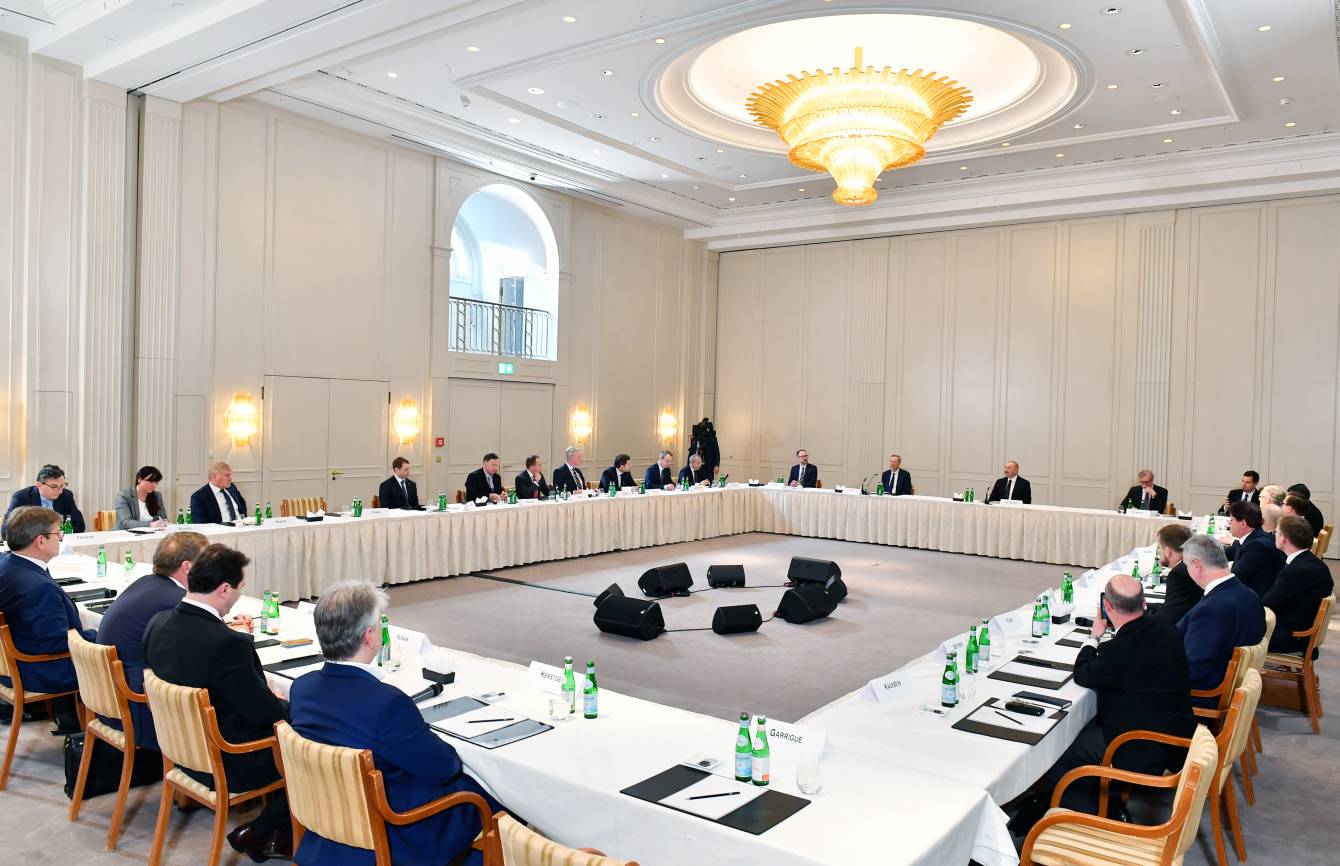
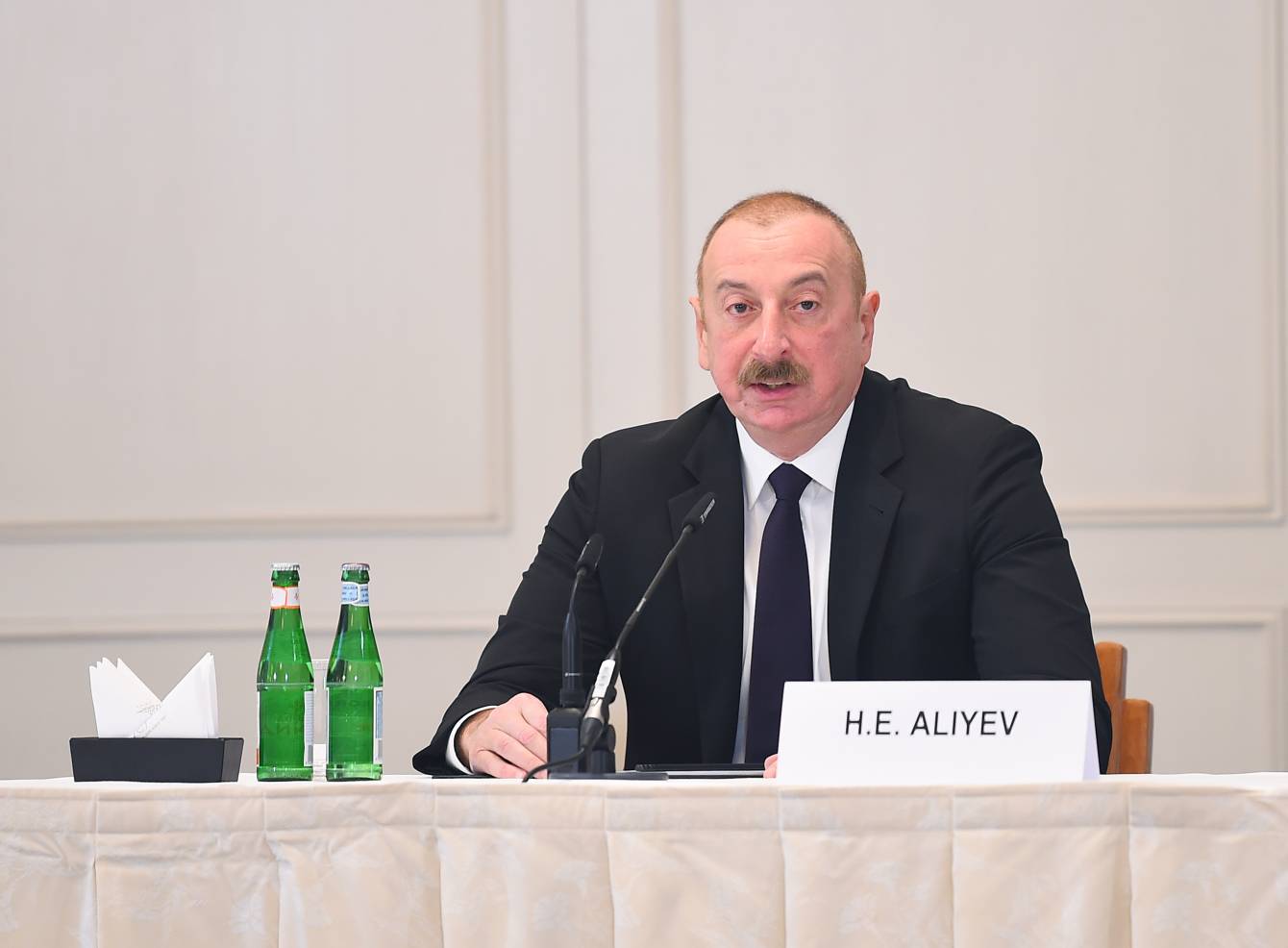
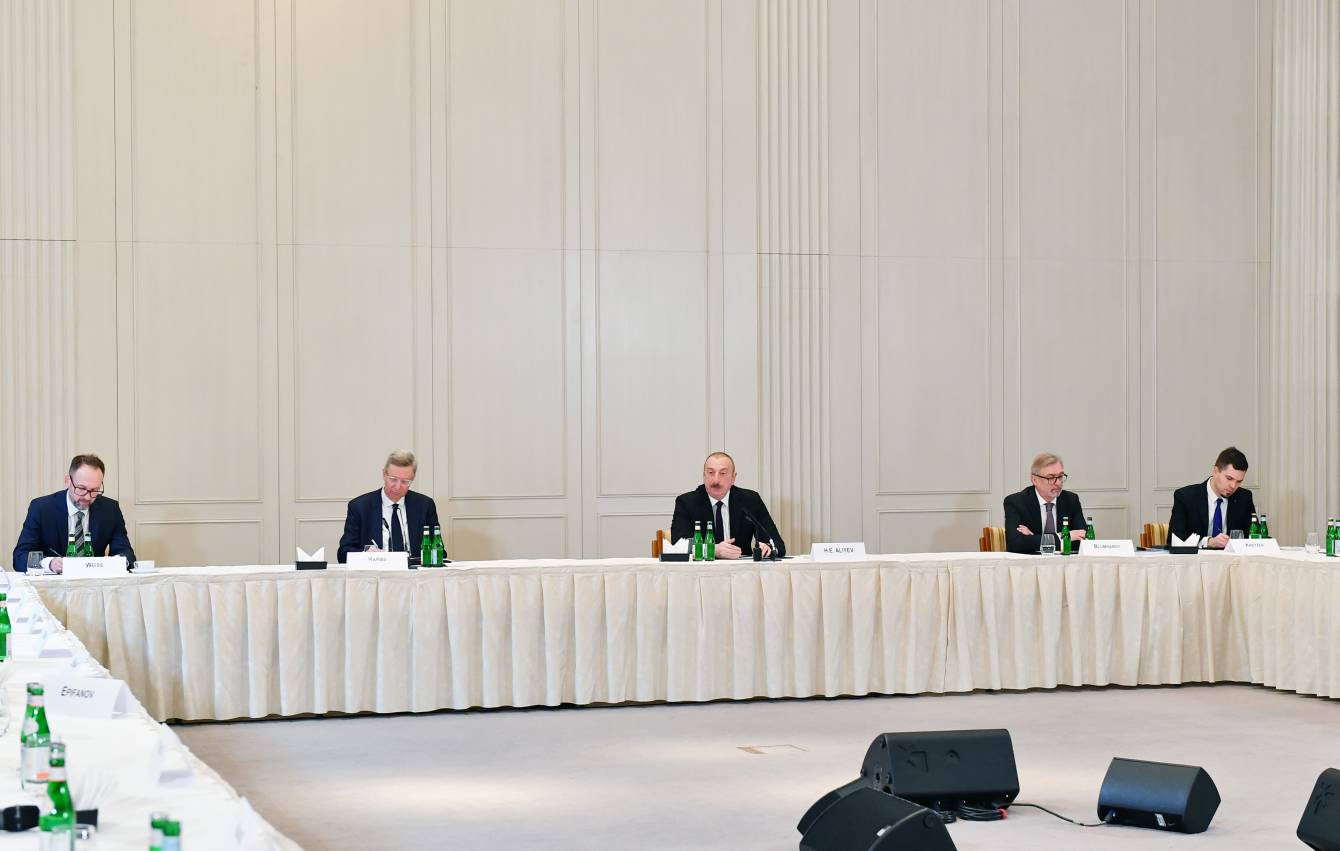
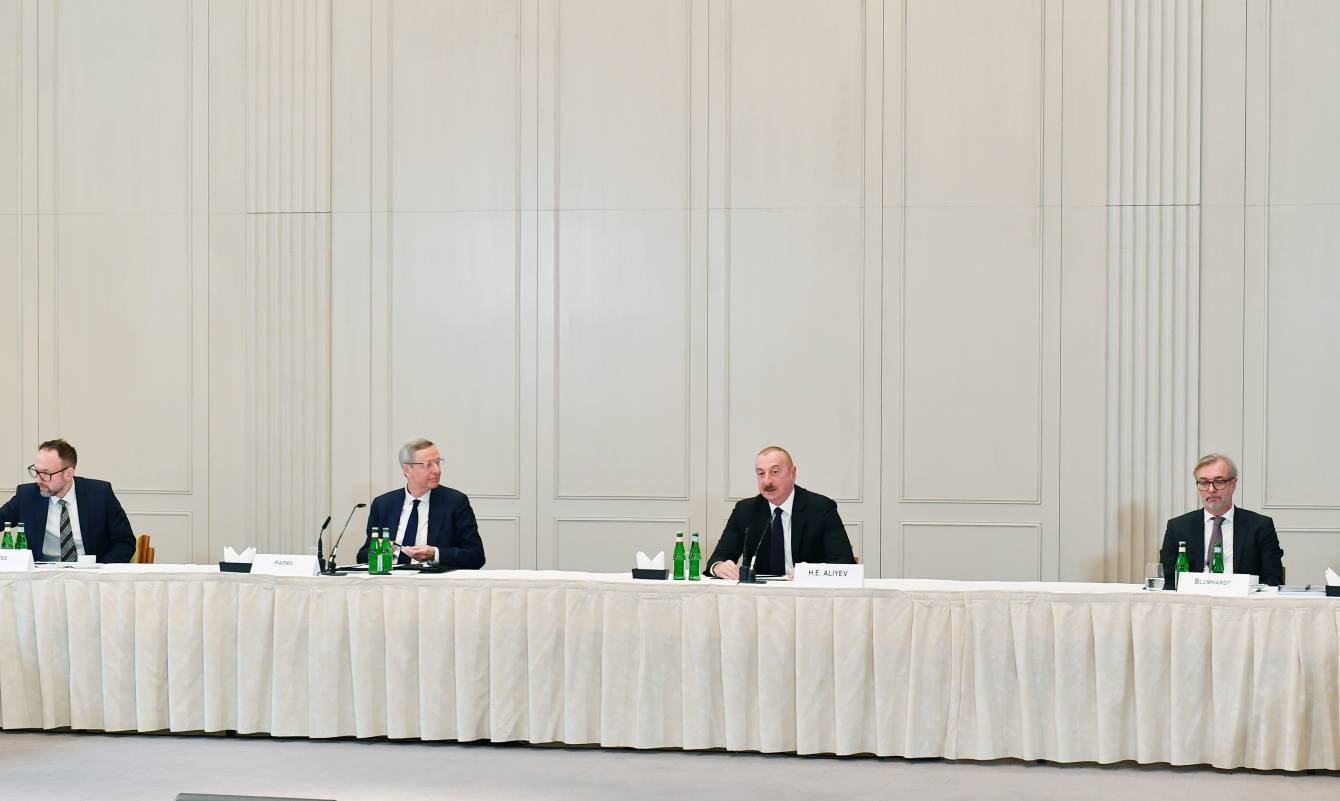
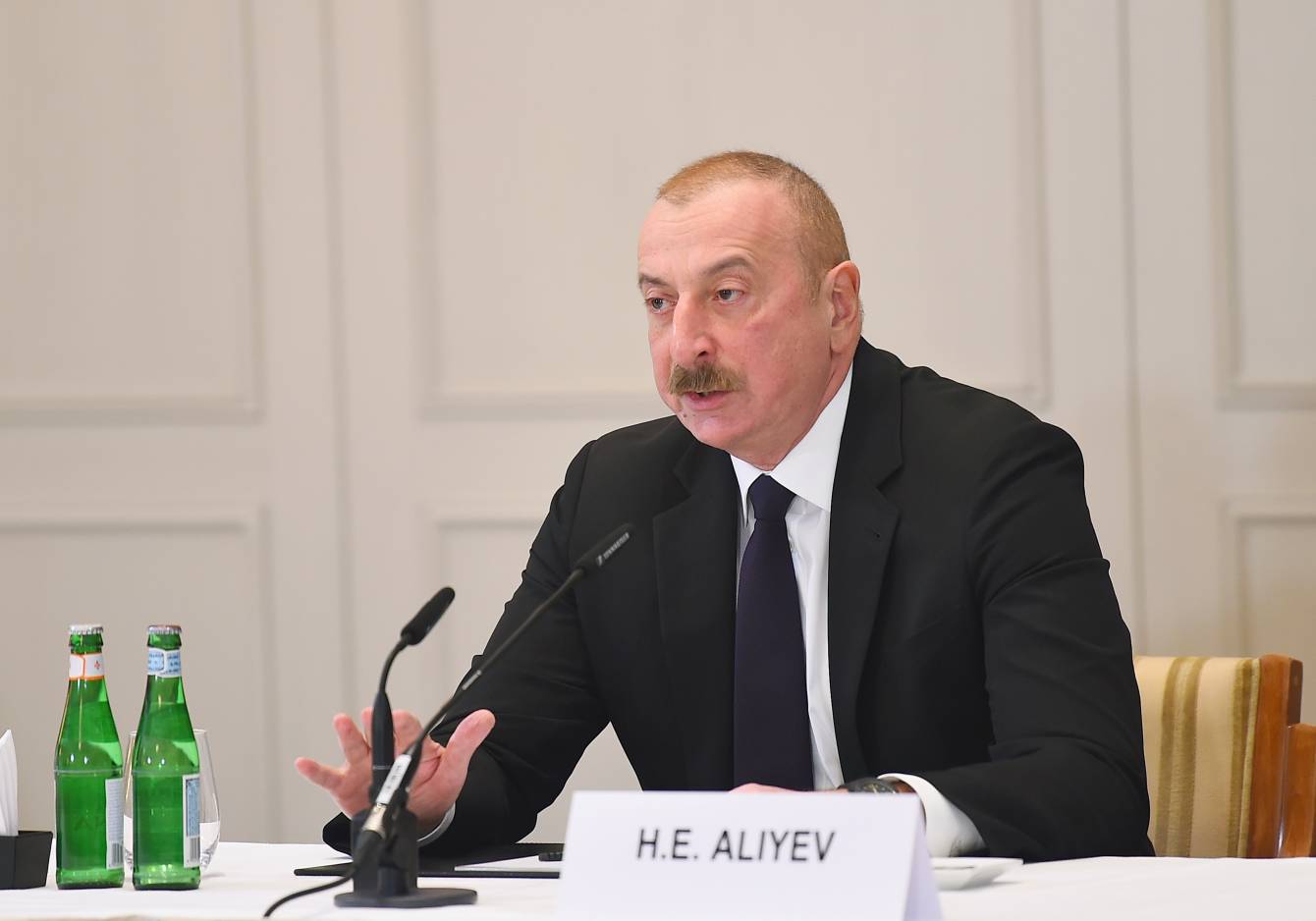
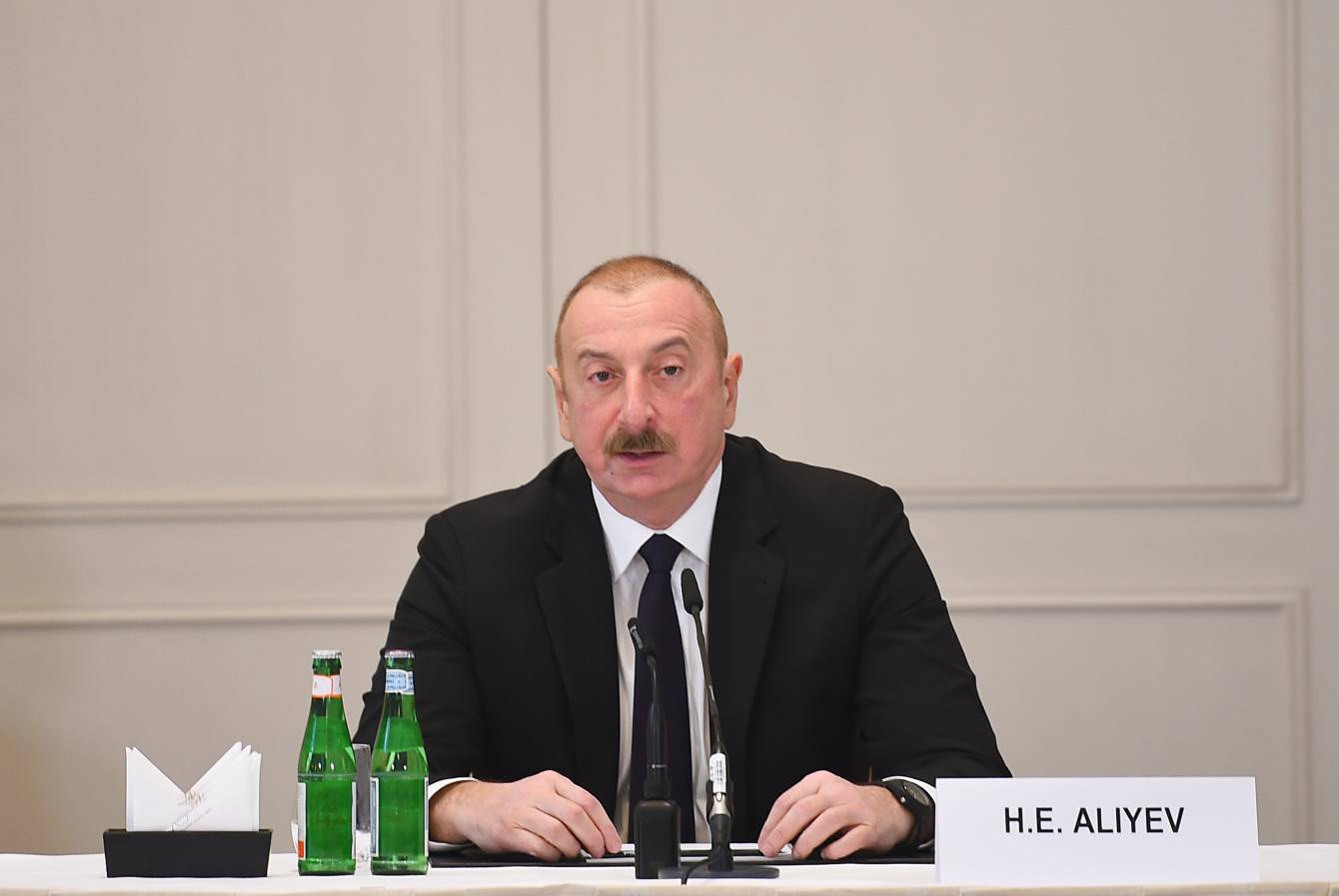
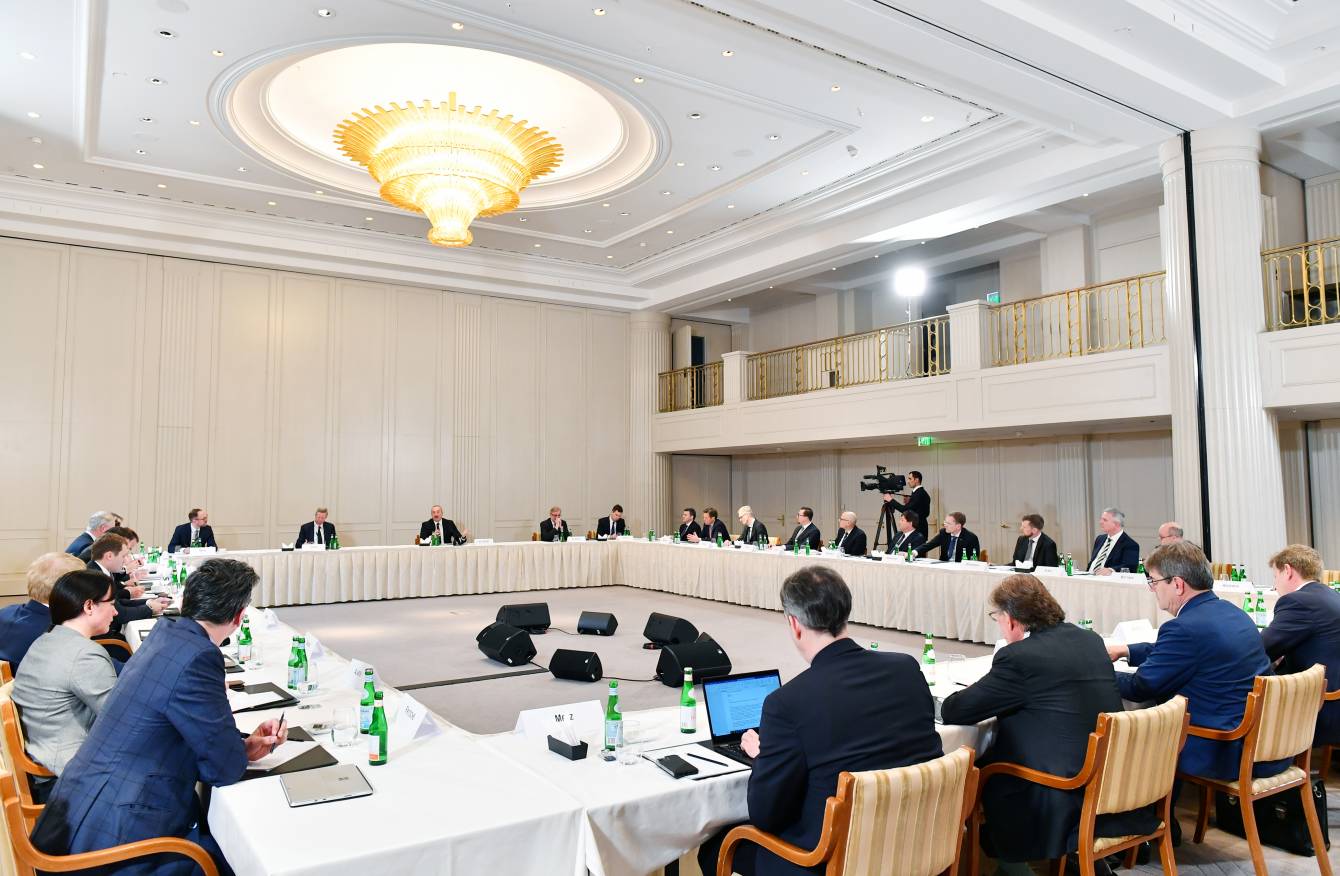
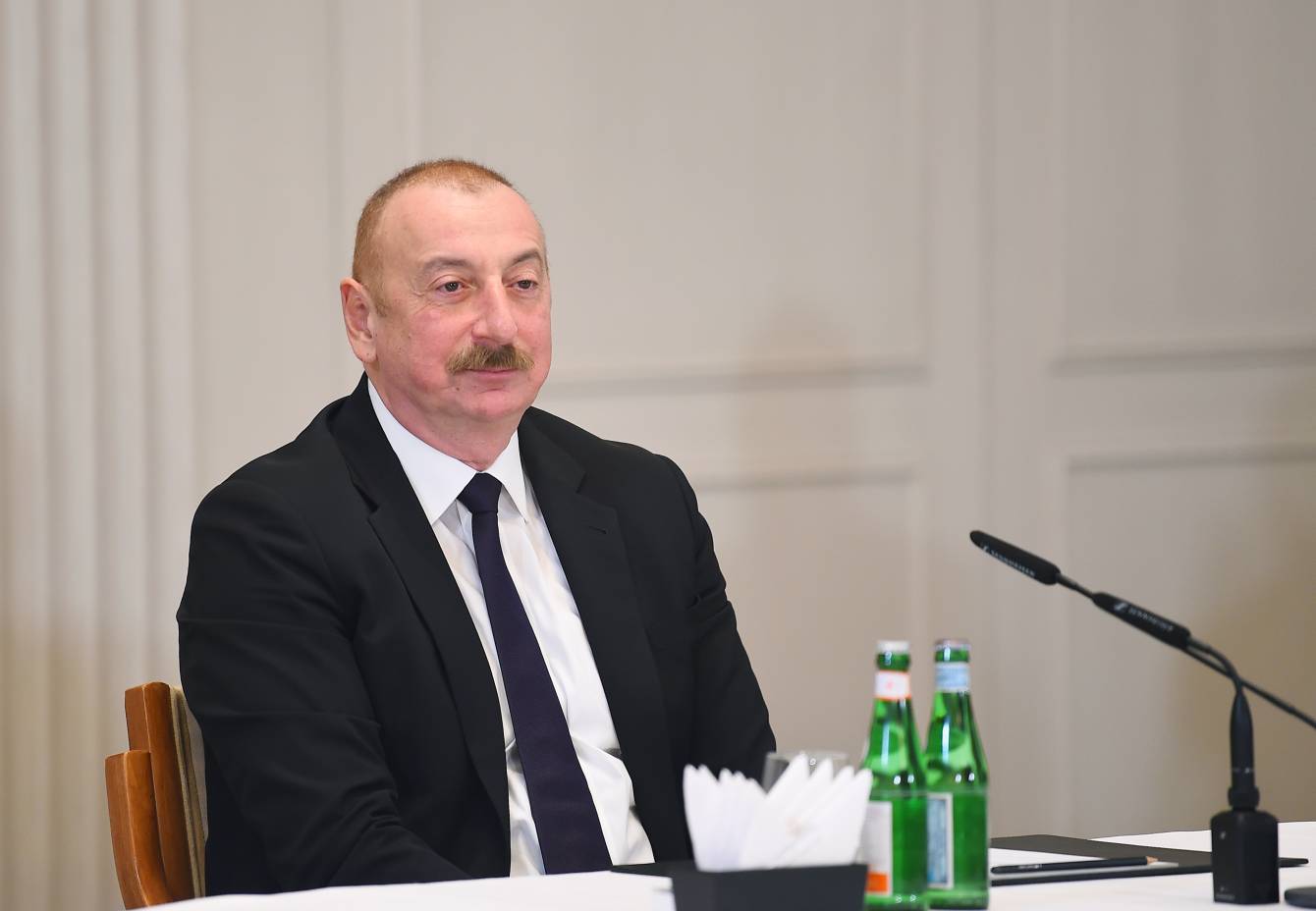
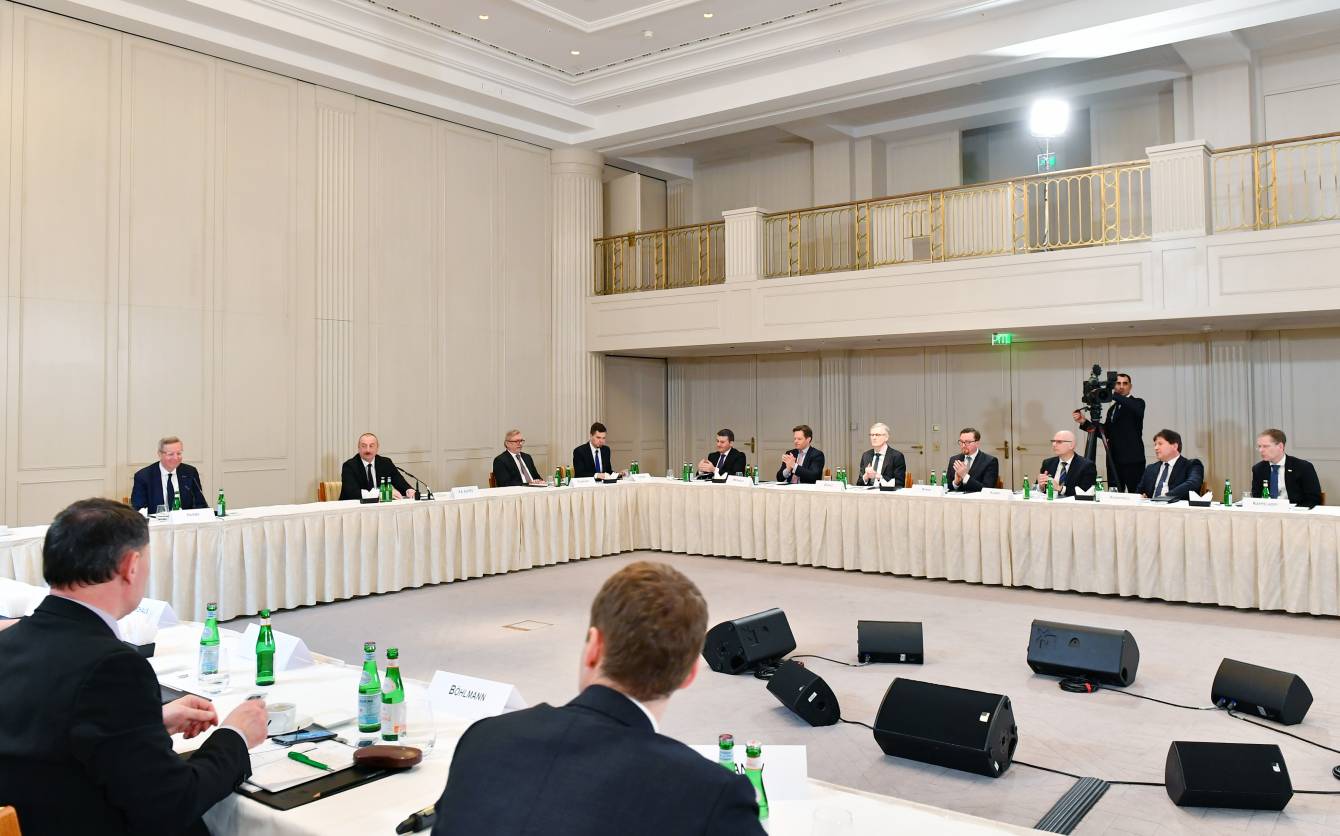
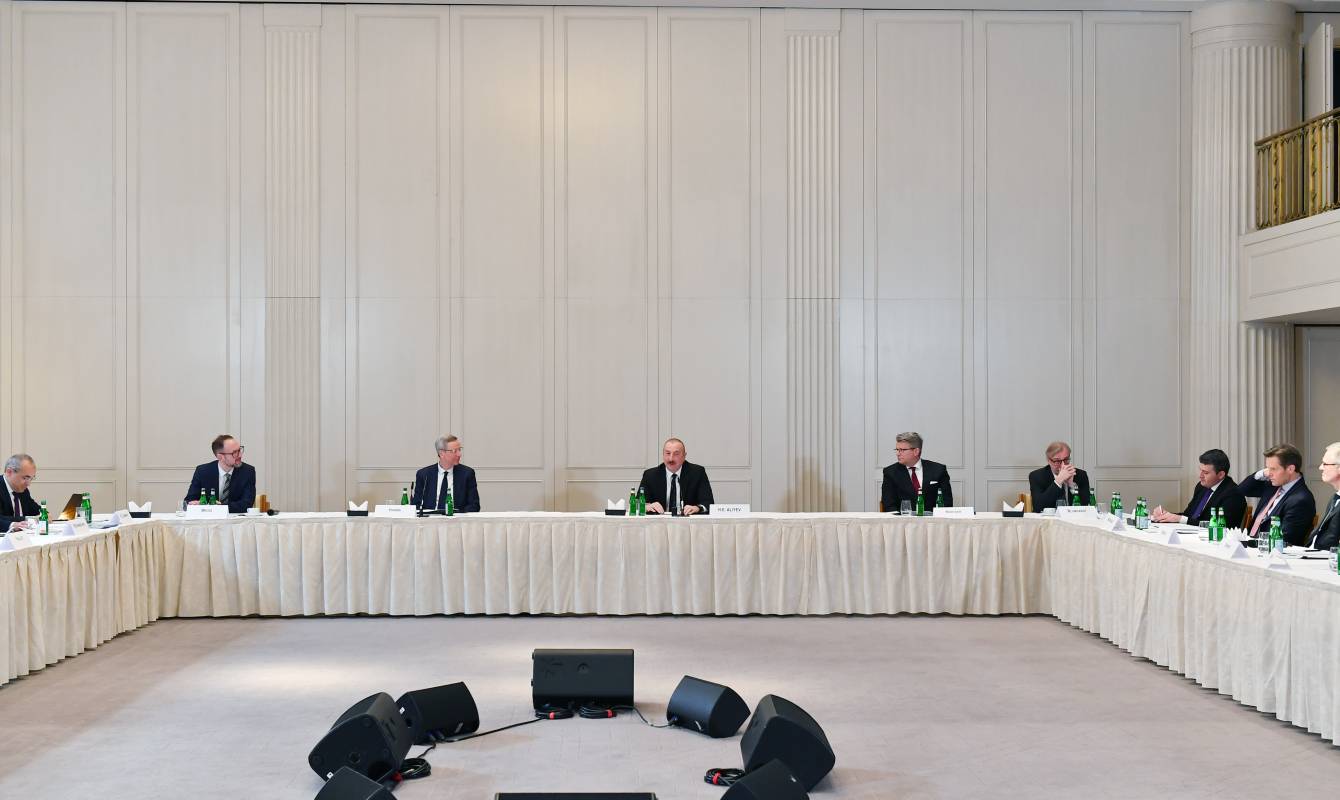
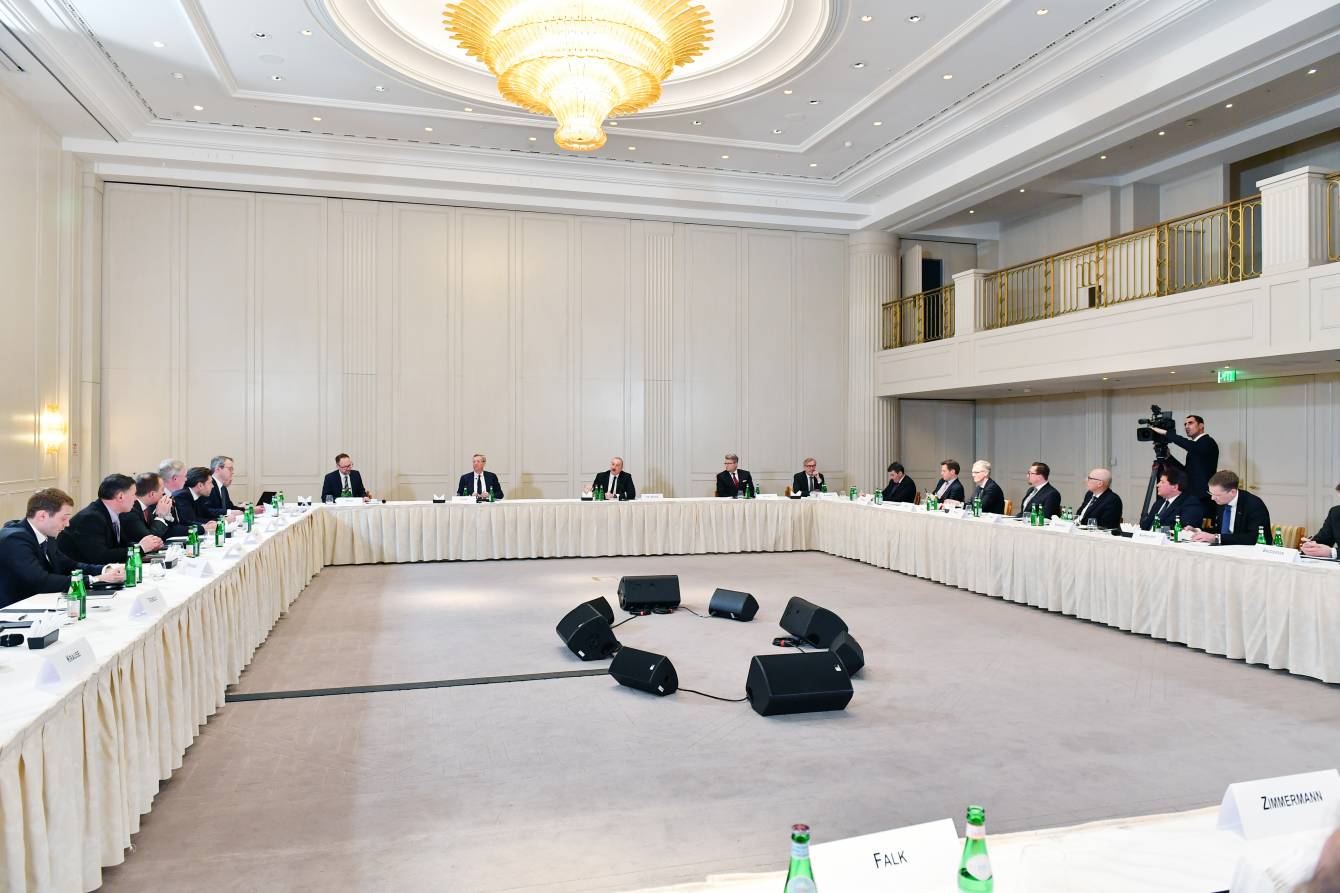
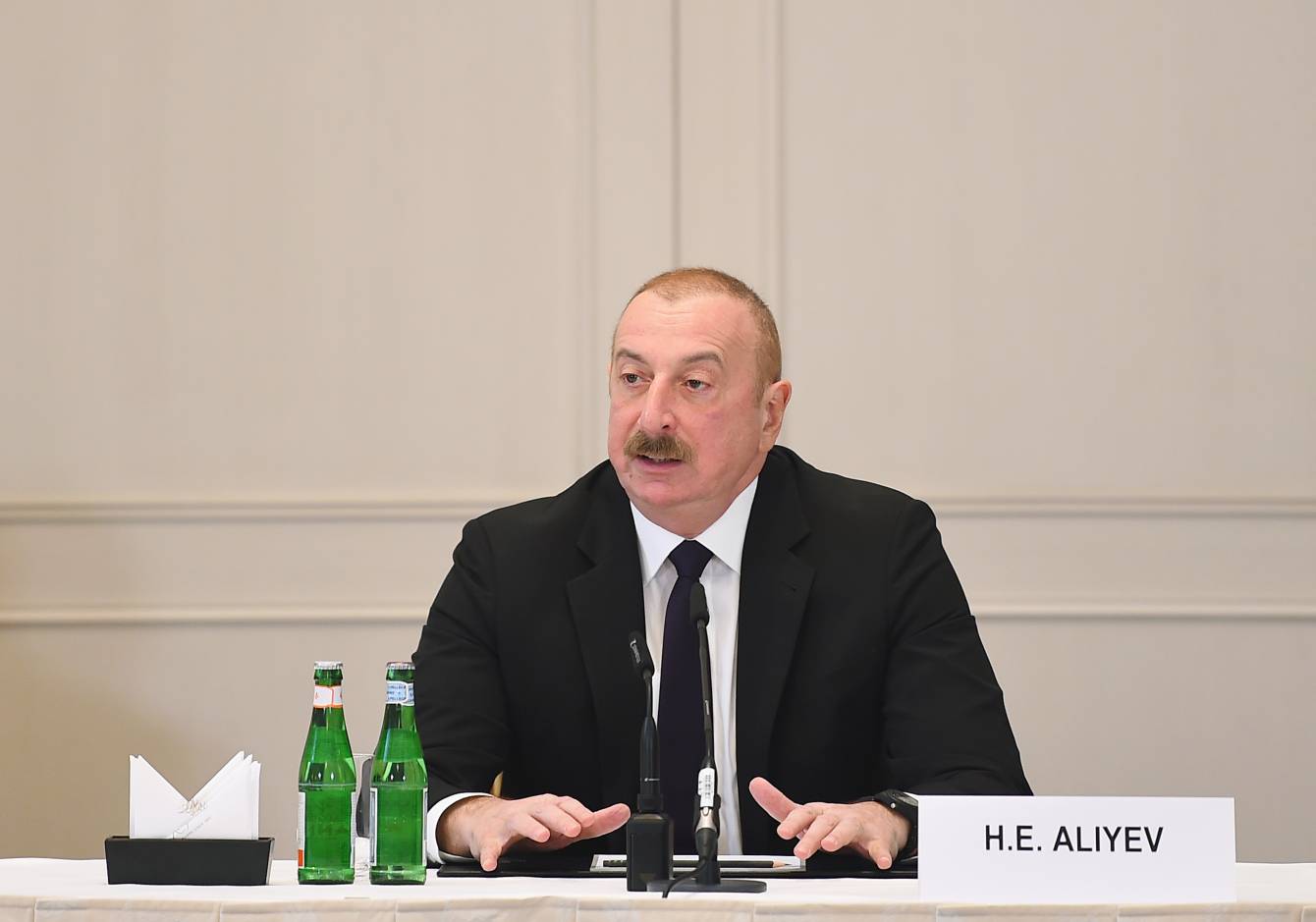
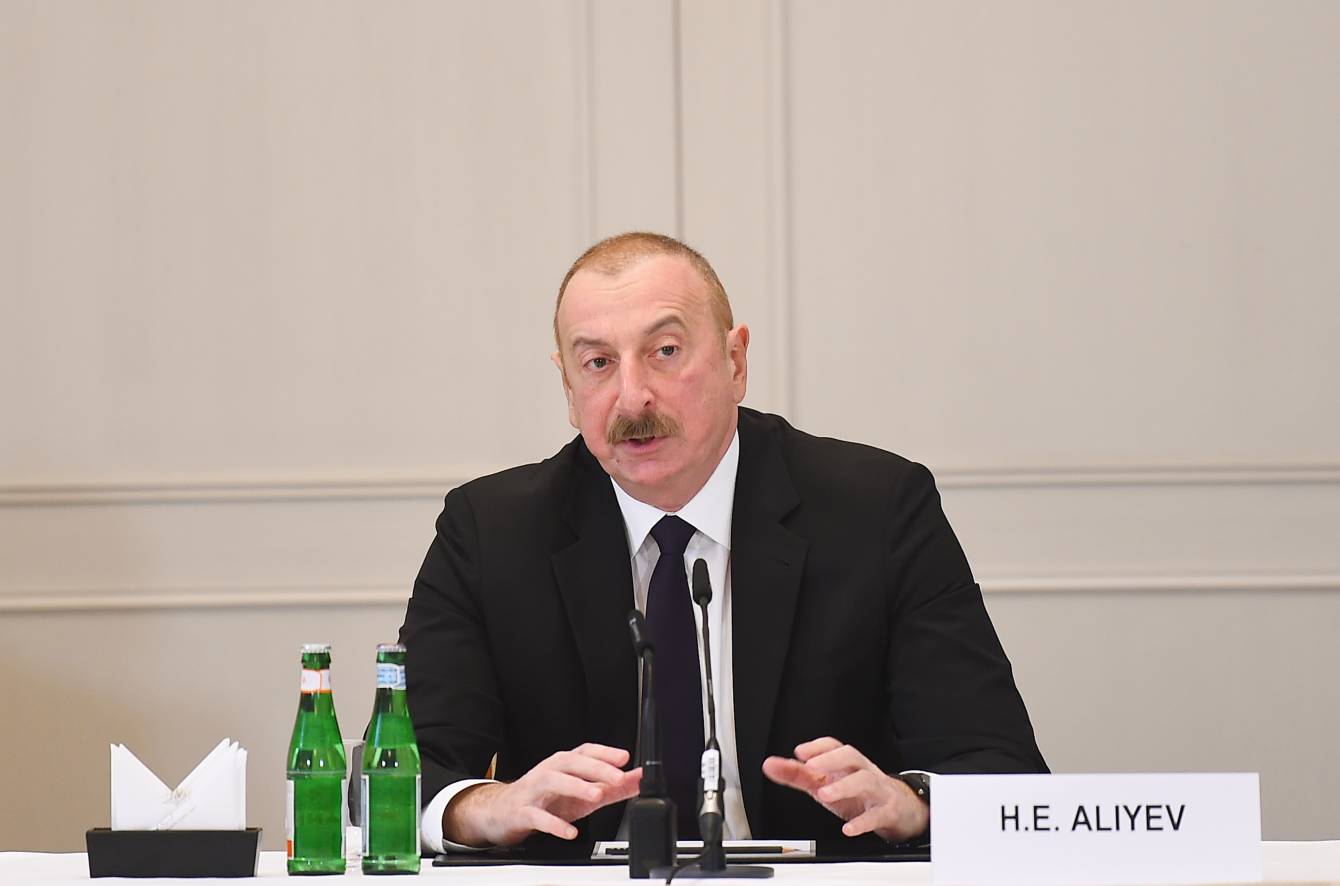
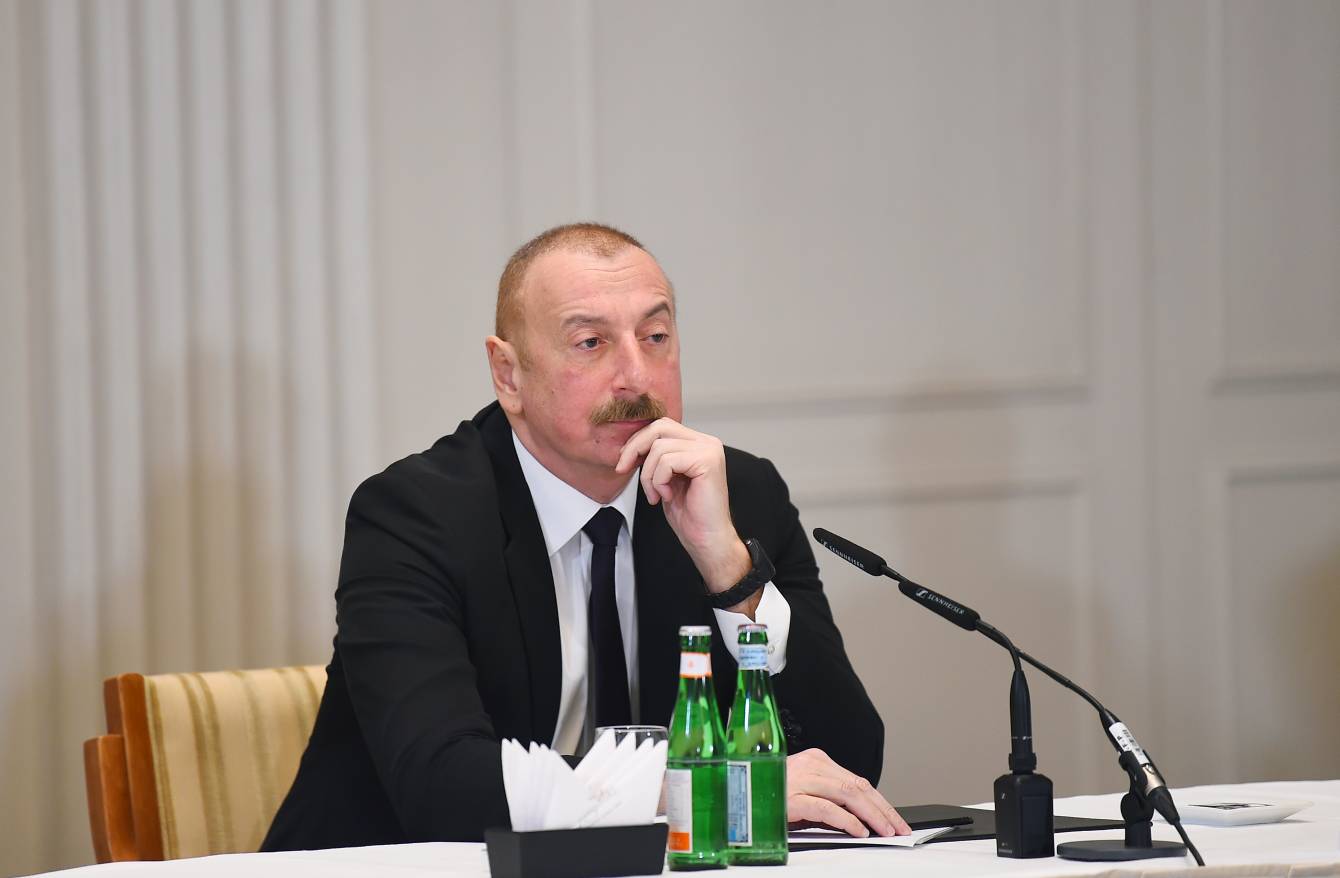
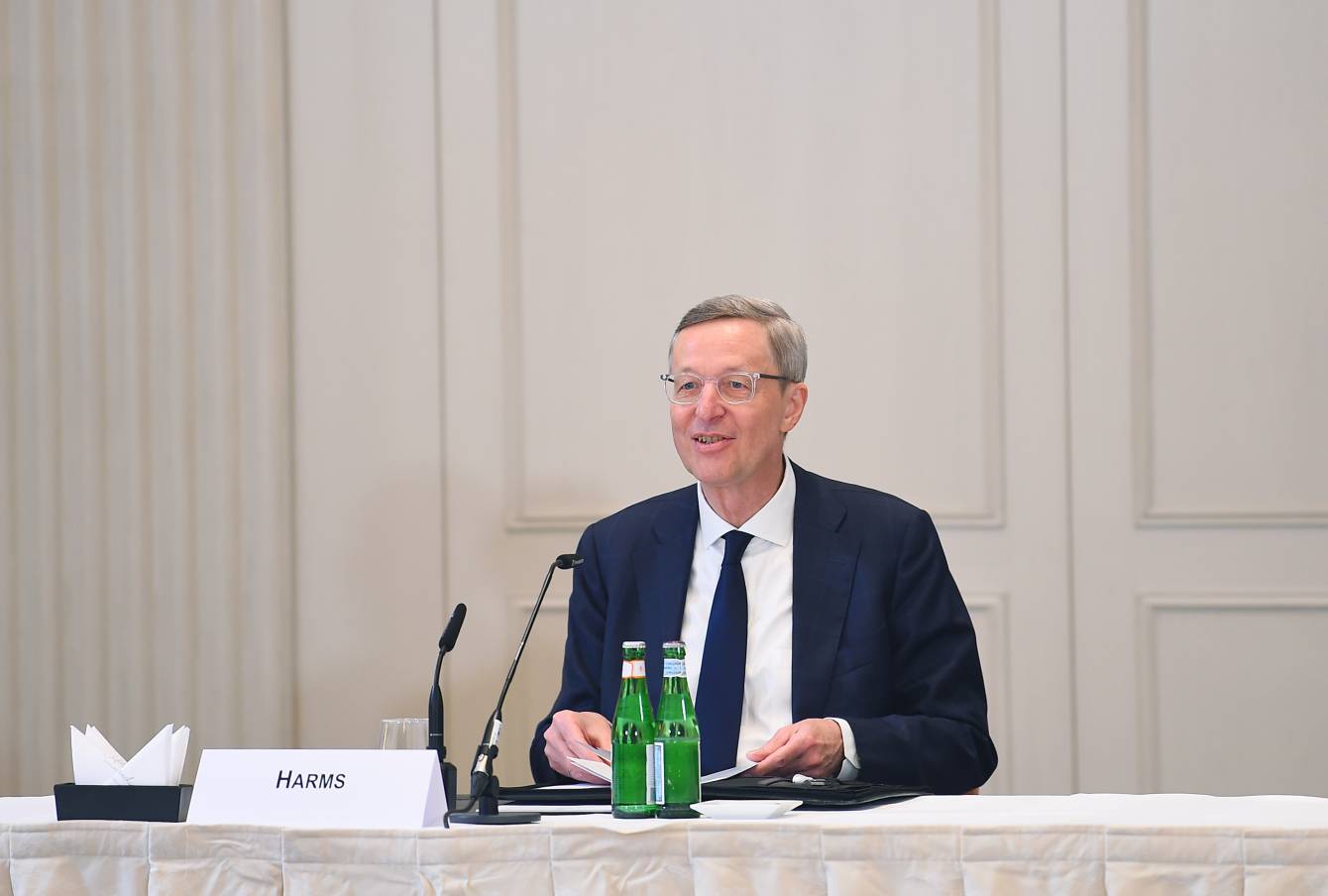
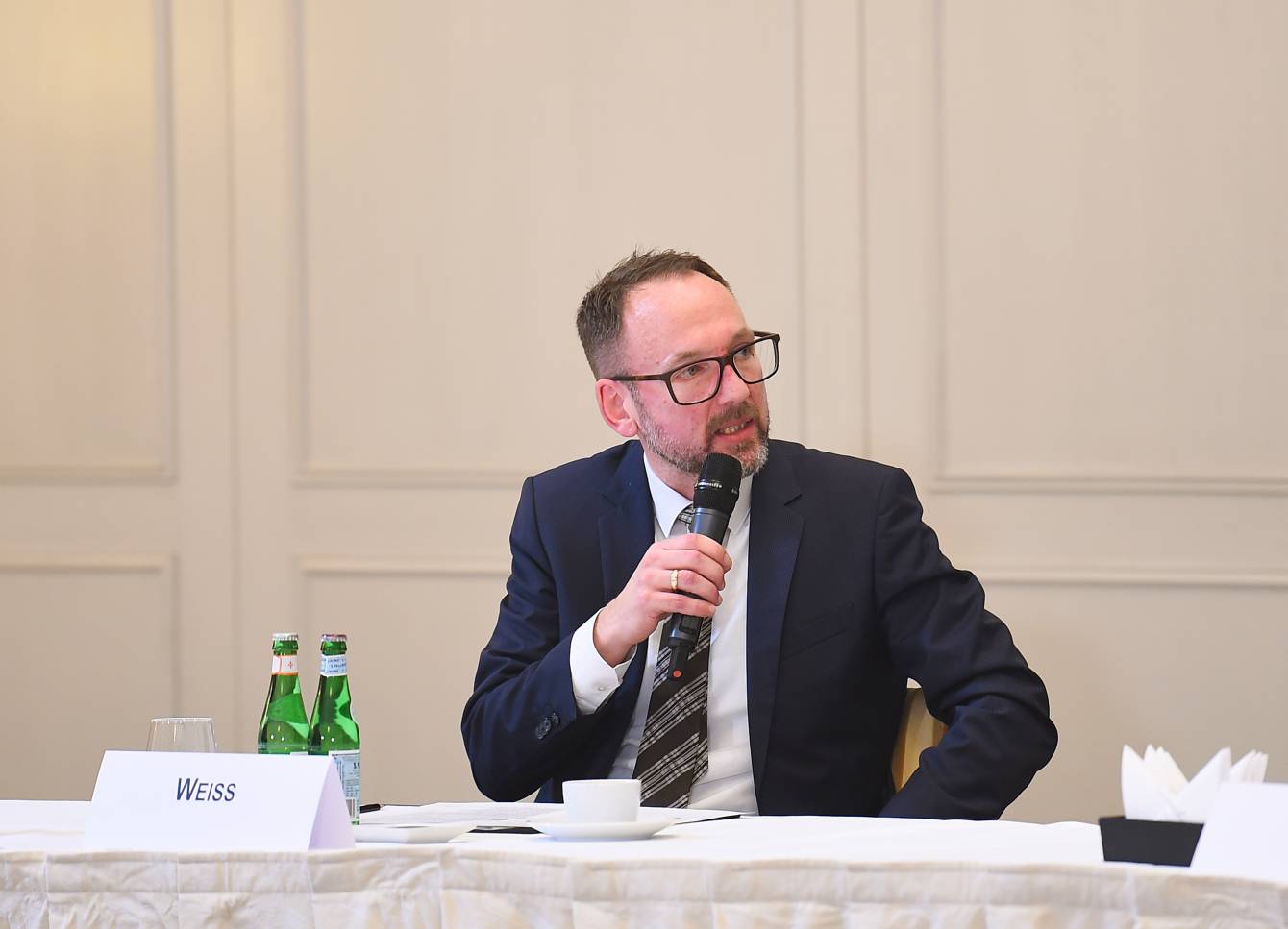
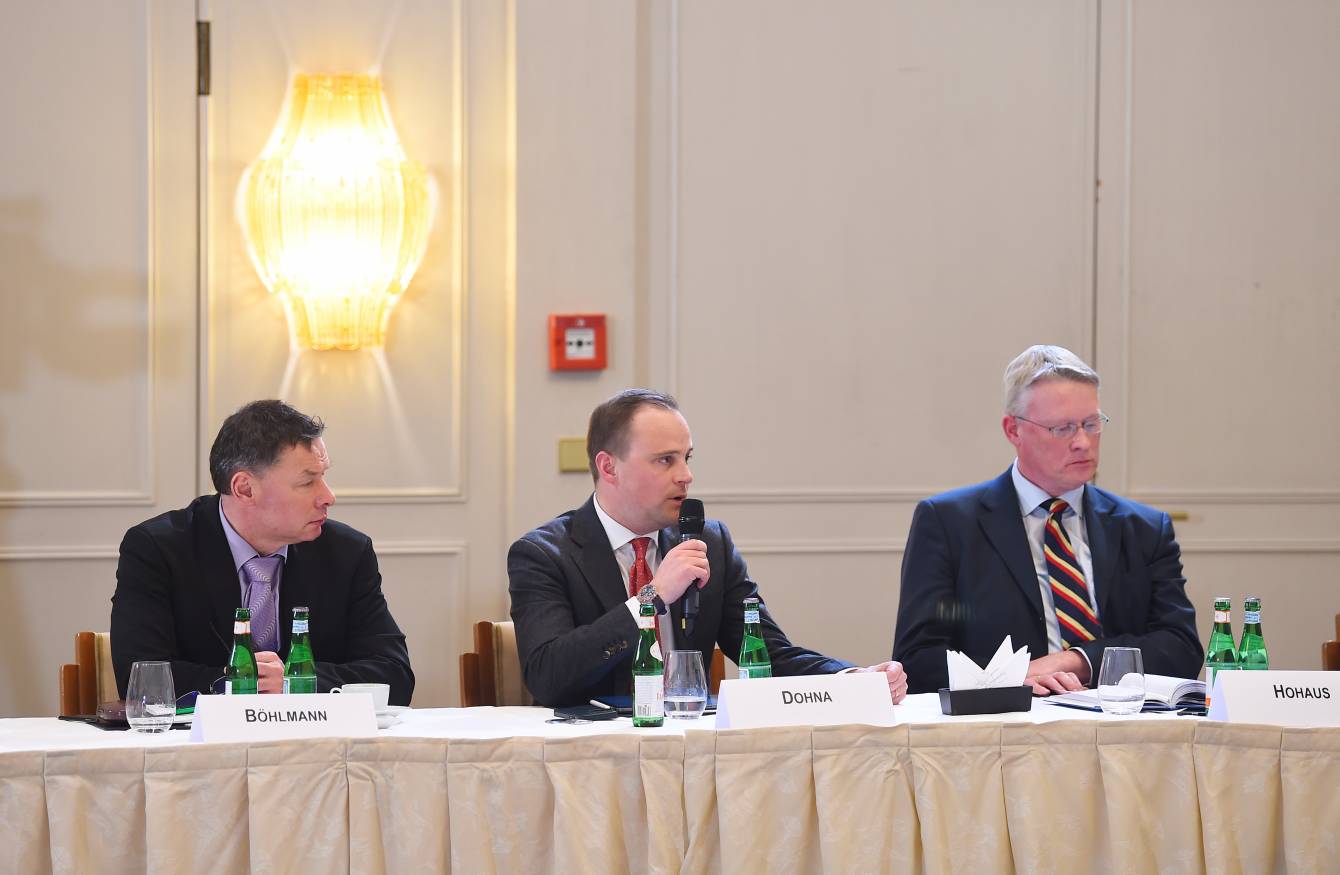
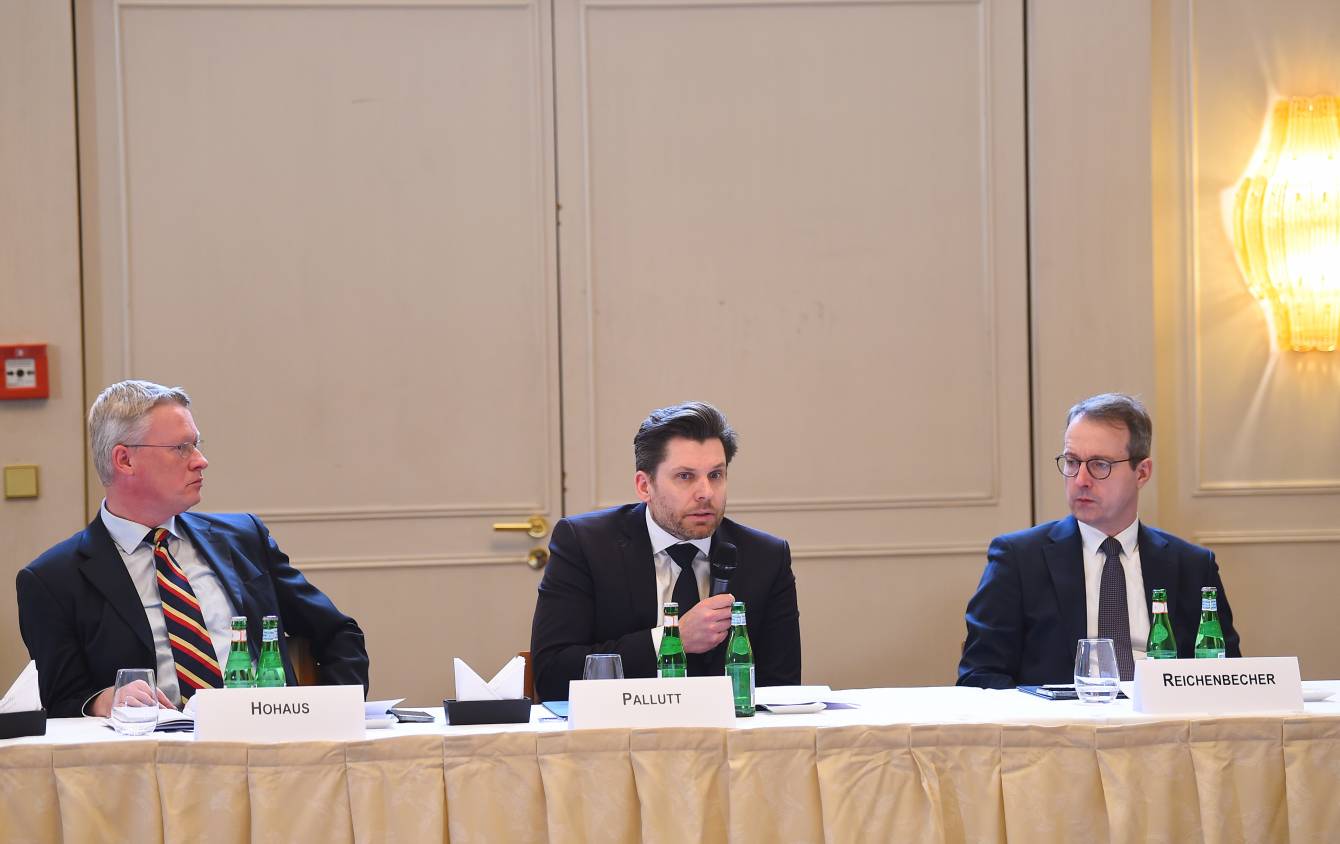
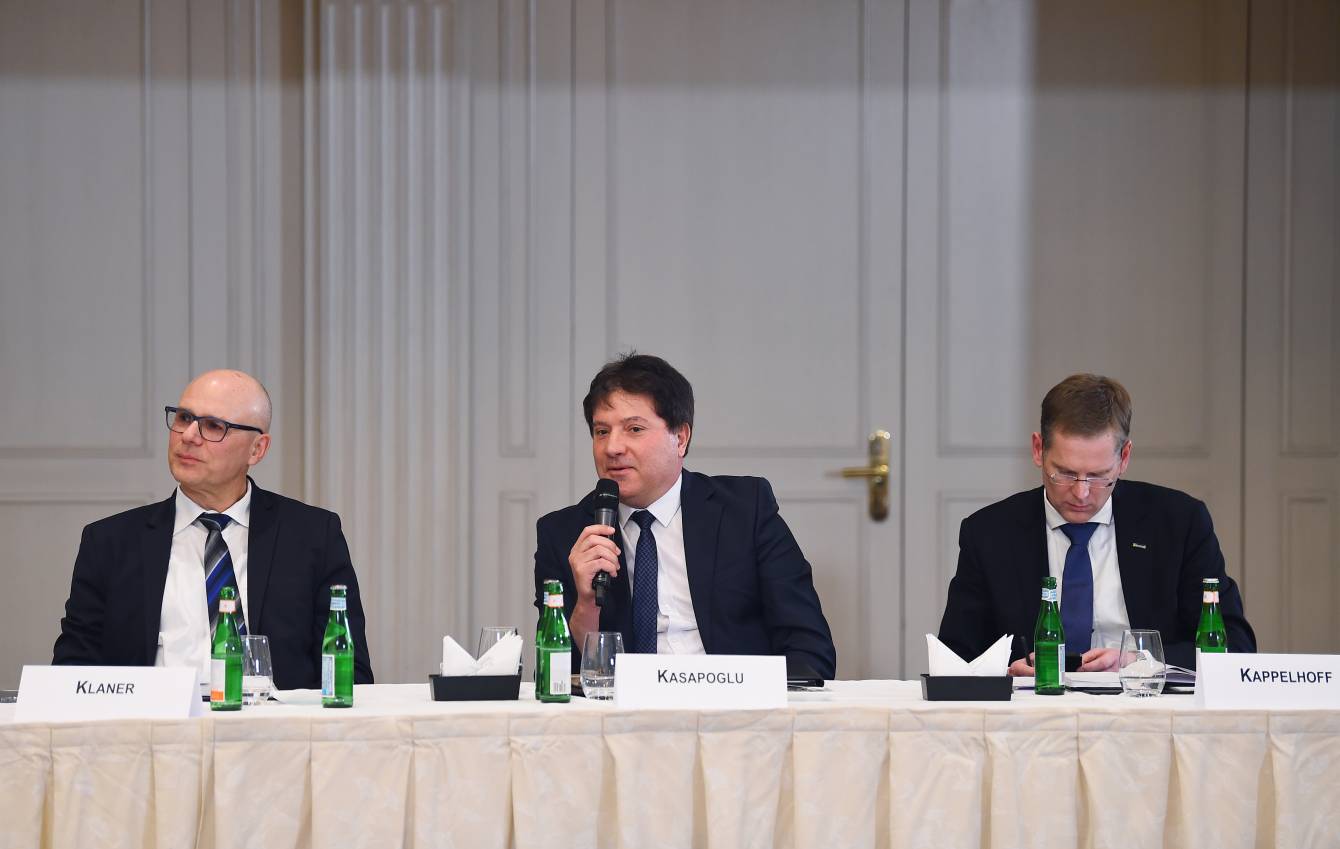
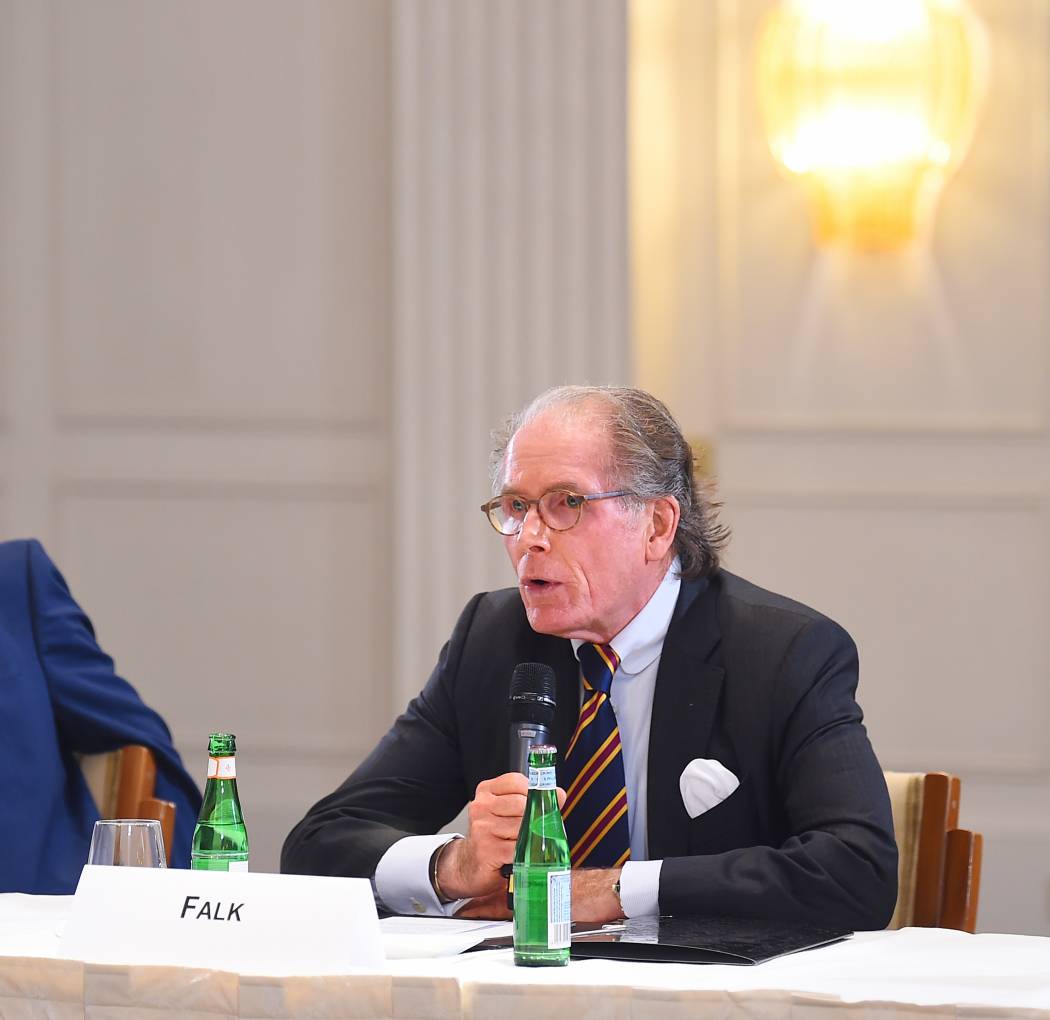

Your Eminence,
We were deeply saddened to hear of the passing of His Holiness Pope Francis, Head of the Holy See and one of the most prominent religious figures of our time.
In the person of Pope Francis, the international community and the Catholic world have lost...
21 April 2025, 14:13I sincerely congratulate you and the entire Christian community of Azerbaijan on the sacred holiday of Easter, and I extend my wishes of happiness and well-being to all of you.
In Azerbaijan, which has rich traditions of tolerance, there has never been a case of...
18 April 2025, 16:25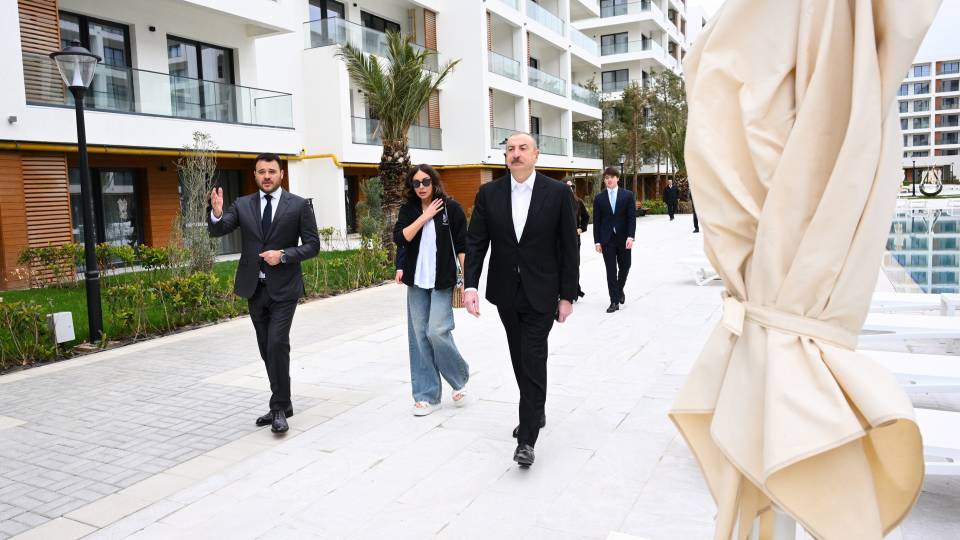
Dear Mr. Çavuşoğlu,
I was deeply saddened to learn of the passing of your father, Osman Çavuşoğlu — a profound loss for your family.
In this time of sorrow, I share in your grief and extend my deepest condolences to you and all the members of your family,...
18 April 2025, 12:37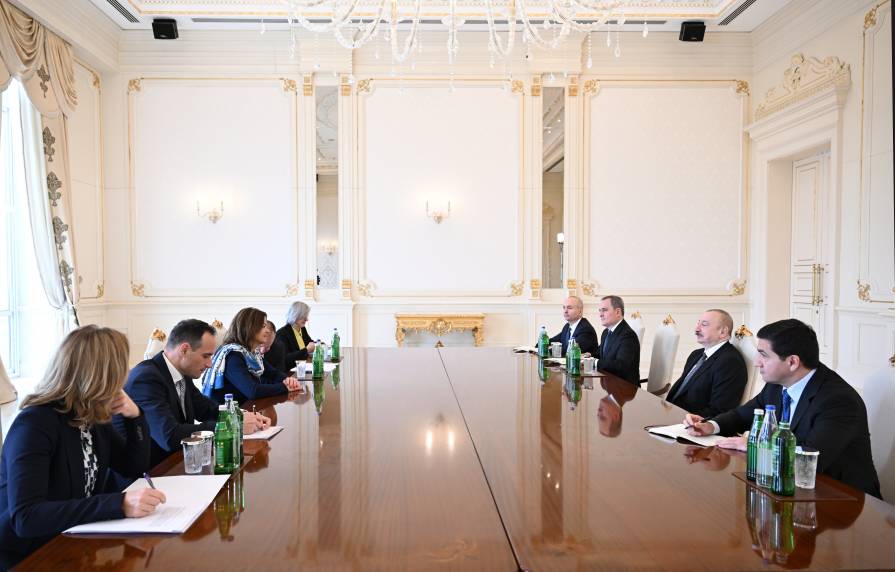
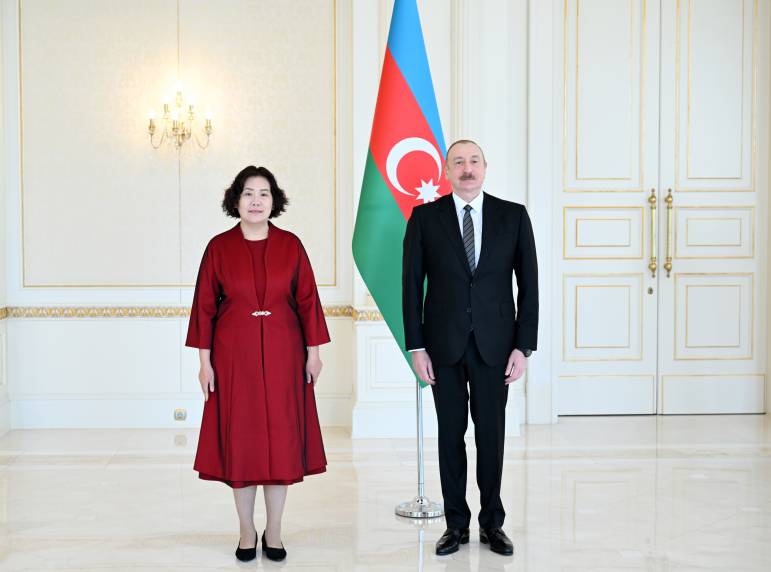
We were deeply saddened to learn of the passing of Richard Armitage – an eminent statesman, distinguished diplomat, dedicated public servant, and a great friend of Azerbaijan.
His years-long, productive service in international politics and diplomacy, coupled with...
16 April 2025, 18:06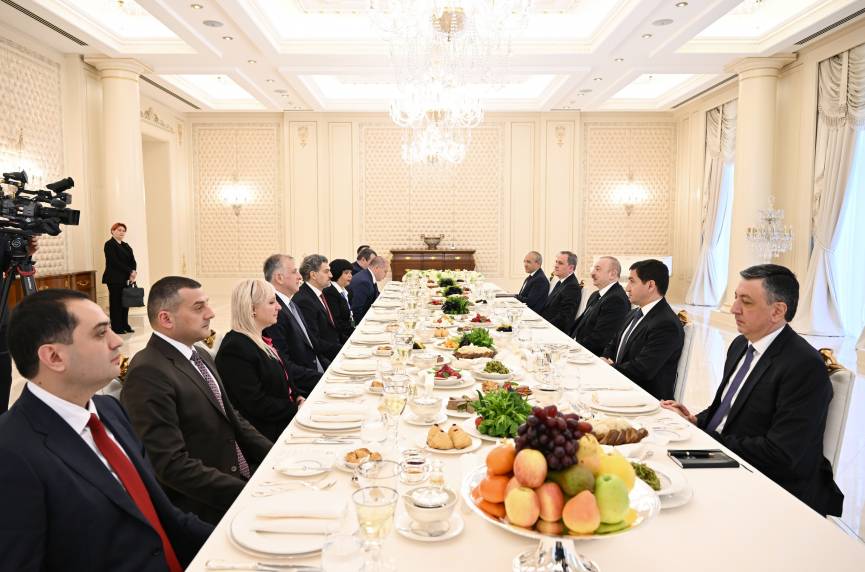
Statement by President Ilham Aliyev
- Dear Mr. President,
Dear guests,
Ladies and gentlemen,
Dear Mr. President, I would like to once again sincerely welcome you to Azerbaijan! I cordially congratulate you again on your election as a President and wish you ...
16 April 2025, 12:12